






GRILLED CHEESE DREAMS






PICTURE THIS: COZY KIDS IN COATS

TRAVELS OF A BRAT PACKER










GRILLED CHEESE DREAMS






PICTURE THIS: COZY KIDS IN COATS

TRAVELS OF A BRAT PACKER



Gov. Tate Reeves and the Mississippi Development Authority (MDA) recently awarded the sixth round of Mississippi Site Development Program grants. Industrial properties in Hancock, Pearl River, and Scott counties were among the latest recipients. Together, sites within Cooperative Energy’s Members’ service territories received over $268,000 in state grant support.
The Hancock County Port and Harbor Commission was awarded $100,000 to two sites within the county. The Commission will clear and grub 10-acre sites at both the Stennis Technology Park and Port Bienville Industrial Park. Both industrial sites are served by Coast Electric.
MDA awarded $118,500 to Scott County for environmental due diligence studies at the Wooten Industrial Site. The funds will be matched locally to complete preliminary review of the developability of the 400+ acre property along Interstate 20 in Lake, Mississippi. The property has the potential to be a prime industrial site with interstate frontage and railroad access along the CPKC line. The site is served by Southern Pine Electric.
Pearl River County received $50,000 for development of the Pearl River County Technology Park. Funds will be used to construct an access road into the 30-acre business park. The technology park aims to recruit light industry, research and development, and other technology-based companies from neighboring Louisiana and surrounding areas. The technology park is served by Coast Electric.
In 2017, the state Legislature created the Mississippi Site Development Program to assist public or private non-profit economic development organizations or local governments with preparing site-ready locations to attract new industry and private capital investment to the state.
Properties within Cooperative Energy’s Members’ service territories have received more than $27 million in Mississippi Site Development Program grants since the program’s inception.
Deploying broadband where terrain is rugged and population sparse is something to celebrate, so it’s no wonder electric cooperatives are marking connection milestones with subscribers and their hardworking sta s in fun and creative ways.
Coast Connect, based in Kiln, celebrates milestones on a regular basis. The broadband subsidiary of Coast Electric gifts Roku Ultra streaming devices via random drawings when new service areas open.
Subscriber No. 5,000 received a basket of co-op goodies and an Amazon Echo smart home device. At milestone 10,000, CoastConnect gave away a smart TV, a streaming service gift card and swag to one lucky subscriber. The co-op is closing in on 20,000 subscribers.
“Our team has been working tirelessly to bring fast, reliable phone and internet service to rural areas of South Mississippi, and we are excited to celebrate each milestone that brings us closer to our goal,” said Ron Barnes, co-op president and CEO of Coast Electric.
Coast Connect is not the only co-op in the state gifting goodies to subscribers when they hit fiber milestones. NT Spark, PearlComm Fiber, Singing River Connect, DE Fastlink, D.E. Lightspeed, M-Pulse Fiber, NE SPARC, FASTnet, East Mississippi Connect, Northcentral Connect, and TEPAconnect all mark the same milestones.
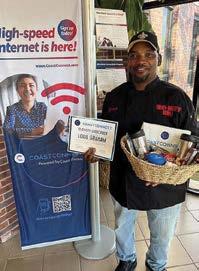









“Improving the quality of life for all those we touch.”
Linemen work every day in all weather conditions to make sure our communities have the power to live their lives. Linemen love their work — acknowledging the challenges but embracing the rewards. At 4-County, we celebrate Lineman’s Day on April 17. We feed them, give them a well-deserved pat on the back and continually pray for their safety. I hope this column gives you a better look into what linemen face on a daily basis.
A lot of people know linework is dangerous because we work near high-voltage electricity. Move just the wrong way or lose focus for a split second, and it could be deadly. Linemen have to be aware of their surroundings and the safety of the person next to them. They’re working with an element of danger that requires concentration, and there is no margin for error. The environment compounds the pressure because when you need power most is usually when the weather is worst. Linemen often work in storms with rain, wind, extreme heat and cold, in the dark, or on the side of the road next to fast-moving tra c. Yes, it’s dangerous, but they willingly accept the challenge.
Many may not realize it, but linemen undergo years of training. After an apprenticeship lasting years, they transition to the prestigious journeyman lineworker status.
But the education is ongoing. Linemen continuously receive training to stay mindful of safety requirements and keep up to date on the latest equipment and procedures.
The daily expectations of lineworkers are physically demanding, but you won’t hear any of them complain about that. They know what they signed up for — loading heavy materials, climbing poles and in and out of buckets. A lot of times, they go places the trucks can’t, often hiking through the woods loaded down with 40 pounds of personal protective equipment. But that’s the job.
Linemen never know what type of situation they are going to face or when they’re going to face it. They get calls in the middle of the night. Sometimes, they miss soccer games and family dinners, but their families are very supportive.
One thing that makes this job worthwhile is the camaraderie. The co-op is a second family for its employees, and the line crews are a brotherhood. In this work, you have to depend on the person beside you in life-ordeath circumstances. It’s a culture of trust, teamwork and service. And it’s all about keeping the teammate beside you safe and the lights on for everybody else.
Linemen have a lot of pride in their work. Even when it’s cold and wet, they know they’re working to keep people warm. There’s a lot of satisfaction in hearing someone yell “Thank you” from the window after the lights come back on or seeing people flipping the light switches on their porches after an outage is restored.
4-County and its employees are members of our local communities. We live in the same neighborhoods. We shop at the same stores. Our kids go to the same schools. If your lights are o , there is a good chance ours are o too. So, you can trust that we are doing our best to get the lights back on as quickly and safely as possible — so you can get back to normal life. Join me in thanking our 4-County linemen, and all linemen nationwide, for their service!
 by Brian Clark
CEO/General Manager
by Brian Clark
CEO/General Manager
Warm temperatures this spring make it a great time to think about how warm it could get this summer. A rise in temperature can also mean a rise in energy bills. Give your air conditioner a fighting chance at keeping your home cool in the months ahead, without using more electricity than necessary.
HERE ARE SOME TIPS TO KEEP ENERGY BILLS LOWER THIS SUMMER:
• Trade your traditional incandescent light bulbs or compact fluorescent bulbs for light-emitting diode (LED) bulbs. These bulbs use far less energy.
• Call a service technician to give your air-conditioning system — and any window units — a thorough once over before the weather gets hot.
• Change air conditioner filters monthly from now until October.
CEILING FANS COOL ENERGY COSTS
Ceiling fans can be a great way to increase energy savings in your home while providing a comfortable living environment. A decorative alternative to typical light fixtures, ceiling fans can cut summer energy use.
Ceiling fans do not lower the temperature in a room. The cooling e ect occurs when air from the ceiling fan blows across a person’s skin.
“When you leave the room, switch the fan and its lights o . You’ll save energy and money,” said Ronnie Vernon, 4-County marketing specialist.
For more information, go to www.4county.org.







4-County Electric Power Association youth leadership delegates Maggie Martin, Gaby Baumbach, Tyler Phillips, and Liv Gundy have graduated from the prestigious Electric Cooperatives of Mississippi Cooperative Leaders Workshop in Jackson.

The purpose of the three-day Jackson workshop, Feb. 21-23, was to provide leadership development and training opportunities for the 85 high school juniors attending and to educate a future generation about the cooperative form of business.


Martin received the top honor at the workshop (see sidebar article). She was named Mississippi’s representative for the National Rural Electric Cooperative Association Youth Leadership Council. “We’re very excited for Maggie,” said 4-County Senior Communications Coordinator Brad Barr. “She is very deserving of this distinction and will represent her family, 4-County, and the Electric Cooperatives of Mississippi in a most exemplary manner,” the 4-County youth Leadership program director added.

The 4-County young leaders enjoyed the workshop with other students from around the state. They met with their state lawmakers, toured the state capitol, participated in problem-solving activities, and attended speeches by motivational speakers who urged them to serve their communities.
Lt. Gov. Delbert Hosemann and Secretary of State Michael Watson spoke to the students during the workshop.




The four students were selected to represent 4-County at the three-day workshop. A total of 85 young leaders, representing electric cooperatives around the state, attended the workshop.
In addition to participating in the workshop, the four young leaders will travel to Washington, D.C. in June for the National Rural Electric Cooperative Association’s Youth Tour.



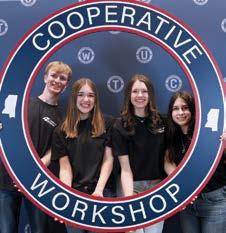






















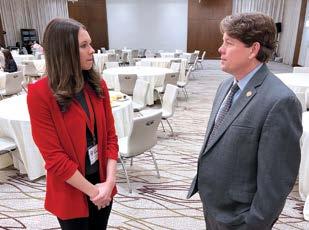





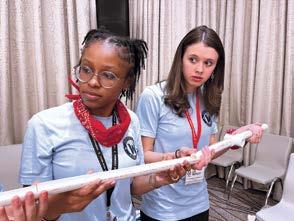

Starkville Academy junior Maggie Martin, daughter of Dr. Andrew and Katherine Martin, was recently named Mississippi’s representative for the National Rural Electric Cooperative Association’s Youth Leadership Council. Students vying for the honor were observed during the Electric Cooperatives of Mississippi’s Cooperative Leaders Workshop in Jackson, Feb. 21-23.
Those competing for the spot were judged on leadership skills, workshop participation, and positive interaction with others. Martin, a 4-County Electric Power Association Youth Leadership Program delegate, also completed an application, created a speech in 10 minutes, delivered the speech to a panel of judges, and interviewed for the spot.
Martin will serve a one-year term, representing 4-County and Mississippi’s electric cooperatives, beginning June 1. As Mississippi’s Youth Leadership Council representative, Martin will receive a $1,000 scholarship. She will participate in ongoing meetings and learning opportunities with other student leaders from across the U.S., plan and implement a project, and serve as a spokesperson for the Cooperative Youth Leaders program, when called upon.



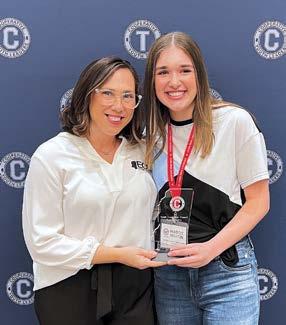














❏ JUNE 6, 2024


❏ Registration & Health Fair • 9 a.m.
❏ Lunch • 10:15 a.m.



❏ Business Meeting • Noon
❏ Door Prizes • from 9 a.m. to 1 p.m. (Grand Prize is a Retired 4-County SUV!)









Nominees submitted for co-op Director


may



LOCATION: COMMUNIVERSITY
7003 S. FRONTAGE ROAD IN COLUMBUS

Jay Gilliland, Bru Sanders, and Russell Dodds are nominated for three-year terms on 4-County Electric Power Association’s board of directors.
Gilliland (District 6, Chickasaw and Webster counties), Sanders (District 3, Monroe, and Clay counties) and Dodds (District 2, Oktibbeha County) – all current board members – were placed in nomination by the association’s nominating committee at its March 14 meeting. Nominations may also be made by petition. The deadline for petitions falls after press time. Any petition nominees will be listed in the May issue and will appear on your ballot.
Nominating committee reports were posted March 14 at both 4-County o ces and online. The deadline for additional nominations for directors, by petition of at least 50 consumermembers, is April 5, no later than noon. At press time, no nominees successfully petitioned to become a board candidate.
Ballot/proxies will be mailed by May 7 to all 4-County members.
The deadline for returning ballot/proxies is May 31 by noon, six days prior to the annual membership meeting June 6.
Members of the nominating committee present for the March 14 meeting included: Paul Crowley, Benny Graves, Charles McMinn, Donald Land, Pete O’Shea, Jr., Belk Weems, Gary L. Holtman, Frank Howell, John Partridge, Brian D. Power, Sammie L. Williams, James Gillespie, Henri Sue Kennard, and Odie L. Shaw.
Pursuant to Article II, Sections 1 and 3 of the 4-County Electric Power Association Bylaws, notice is hereby given that the Annual Meeting of members of 4-County Electric Power Association will be held Thursday, June 6, at noon.
In accordance with the laws of the state of Mississippi and the Bylaws of the Association, three directors will be elected for threeyear terms, reports will be given on the operation of the Association for the past year, and other matters of business will be addressed.
Bru Sanders
Secretary-Treasurer
4-County Electric Power Association Board of Directors
A tradition of dependable, hometown service since 1937
CARTHAGE: 601-267-5671 | PHILADELPHIA: 601-656-2601 | RANKIN: 601-829-1201 |
SEBASTOPOL: 601-625-7422


You probably don’t think about them until your power goes out, but electric lineworkers protect our homes and communities 24 hours a day. Like other first responders who keep us safe, lineworkers endure all kinds of weather and challenging conditions.
In April, we celebrate Lineworker Appreciation Month to honor the men and women who power life. Here are some quick facts about lineworkers and the work they do.
Lineworkers first appeared during the 1840s rush to spread telegraph service across the U.S., stringing wires between trees and other natural objects. It didn’t take long for everyone to realize tall poles were safer and more practical.
Restoring electricity after a power outage is just one of the many duties of lineworkers, who also:
• Install and connect new power lines to homes and businesses
• Maintain and perform upgrades to improve our electric grid
• Diagnose and pinpoint power delivery issues
• Plan and manage large-scale projects
• Ensure safe work practices in often challenging conditions Lineworkers are responsible for maintaining and upgrading the nation’s electric grid that connects more than 7,300 power plants to 145 million consumers through 60,000 miles of high-voltage lines, millions of miles of distribution lines and more than 50 million transformers.
Lineworkers climb with up to 40 pounds of safety gear and tools. That’s like carrying a 5-gallon water jug! Here’s what they typically wear to stay safe while working:
• Hard hats
• Safety glasses
• Flame-resistant clothing
• Arc flash protective clothes
• Rubber gloves & sleeves
• Climbing belts
• Fall-protection harnesses
One essential tool for lineworkers is the hot stick, an insulated fiberglass pole used to safely move energized wires and other equipment. Hot sticks vary in size depending on the job.

Squirrels and snakes are a major cause of power outages, and lineworkers encounter plenty of both while working. They’ve also been known to rescue kittens that climbed too high in a tree and curious bears on top of utility poles. When your o ce is the great outdoors, these encounters are part of the job.
Described by the Energy Department as one of the nation’s highest-paid professions that doesn’t demand postsecondary education, becoming a journeyman lineworker typically requires a high school diploma or equivalent, training and a paid apprenticeship, which typically spans four years. Apprentice lineworkers receive hands-on training and experience in the field before advancing to “journeyman” status.
Roughly 60,000 lineworkers hit the road annually to respond to devastating storms and the damage they leave behind. In addition to extreme weather exposure, lineworkers face a variety of dangers, including electric shock, falls from elevated work locations and roadside tra c accidents. High injury rates among early lineworkers led to the creation of apprenticeship programs and organized labor throughout the industry.
Safety is always the number one priority, which is why lineworkers continuously receive training to stay mindful of safety requirements and up to date on the latest equipment and procedures.
Lineworkers power our lives. The next time you see one, remember to thank them for the essential work they do.






A group of 85 high school juniors from all over the state gathered in Jackson from Feb. 21 to Feb. 23 for the 37th Electric Cooperatives of Mississippi Cooperative Leaders Workshop.
The program instills leadership skills, inspires creative thinking, encourages community service, and introduces students to legislative elected o cials from their communities.
The conference was held at The Westin in downtown Jackson.
The students earned the trip to the workshop following a competitive selection process sponsored by their local electric cooperative. They will travel to Washington, D.C. in June for a seven-day youth leadership tour.







Central Electric students Abreale Leflore, Katie Sockey, and Mitch Pucklitsch spent the three days in Jackson with other students from around the state. They met with their state lawmakers, toured the state capitol, participated in problem solving activities, and attended speeches by motivational speakers — including one by political cartoonist Marshall Ramsey — who urged them to serve their communities.
Lt. Gov. Delbert Hosemann and Secretary of State Michael Watson spoke to the students during the workshop.

























 by Miranda Boutelle
by Miranda Boutelle


Earth Day is April 22, a time when we celebrate this beautiful planet we are lucky to call home. During this day of appreciation, I encourage you to take action at home by making changes to conserve energy. If we all contribute, even small adjustments and changes to how much energy we use can have positive impacts.
Electricity is essential to our daily lives. It gives us opportunities to learn, keeps us safe and comfortable, and provides entertainment. The downside is that every source of energy generation has consequences. Fossil fuels emit carbon. Hydropower dams limit the passage of migrating fish. Even solar panels can’t be made without mining minerals. Using less electricity is a way to mitigate the impact of producing the electricity that powers our lives.
Before diving into ways to use less energy, it’s important to know the di erence between conservation and energy e ciency. Energy e ciency refers to equipment that uses less energy to do the same job. For example, ENERGY STAR®-certified refrigerators keep your food just as fresh as standard models but use about 9% less energy to do it, according to the U.S. Department of Energy. Conservation is using less energy by changing behavior and practices. For example, adjusting your thermostat to be closer to the temperature outside or turning o the lights or a ceiling fan when you leave the room conserves energy.
Conservation has the best return on investment. It’s often free and can save a little or a lot — depending on what you are changing and how drastic of a change you make.
Let’s start with what’s typically the biggest energy user in the average household: heating, ventilation and air conditioning






(HVAC) equipment. Save energy while you sleep by programming your thermostat to be a few degrees closer to the outside temperature at night. In colder climates, add an extra blanket or comforter to your bed to keep you warm.
Typically, the second biggest energy user is the water heater. Replacing an electric storage water heater with a heat pump/hybrid water heater is a great example of an energy e cient project. Adjusting the temperature setting to the recommended 120 degrees and using less hot water in your home conserves energy. Wash clothes in cold water. When washing dishes, don’t let the hot water run longer than necessary.
Earth Day also lends itself to thinking of ways we can connect with each other and limit our screen time. Look for electricity-free opportunities with your family or community. I like to unplug and get outside with friends and family. Going for a hike, a walk or even just spending time in your yard or local park is a great way to reconnect with others and nature. Before you head out, adjust that thermostat and turn o everything possible. Unplug chargers from outlets and turn o all electronics and lights.
I am grateful for this planet we call home. It o ers so much to sustain us. Any small changes we can make to benefit the planet can add up if we all pitch in.
Miranda Boutelle is the chief operating o cer at E ciency Services Group in Oregon, a cooperatively owned energy e ciency company.




















You probably don’t think about them until your power goes out, but electric lineworkers protect our homes and communities 24 hours a day. Like other first responders who keep us safe, lineworkers endure all kinds of weather and challenging conditions.
In April, we celebrate Lineworker Appreciation Month to honor the men and women who power life. Here are some quick facts about lineworkers and the work they do.
Lineworkers first appeared during the 1840s rush to spread telegraph service across the U.S., stringing wires between trees and other natural objects. It didn’t take long for everyone to realize tall poles were safer and more practical.
Restoring electricity after a power outage is just one of the many duties of lineworkers, who also:
• Install and connect new power lines to homes and businesses
• Maintain and perform upgrades to improve our electric grid
• Diagnose and pinpoint power delivery issues
• Plan and manage large-scale projects
• Ensure safe work practices in often challenging conditions Lineworkers are responsible for maintaining and upgrading the nation’s electric grid that connects more than 7,300 power plants to 145 million consumers through 60,000 miles of high-voltage lines, millions of miles of distribution lines and more than 50 million transformers.
Lineworkers climb with up to 40 pounds of safety gear and tools. That’s like carrying a 5-gallon water jug! Here’s what they typically wear to stay safe while working:
• Hard hats
• Safety glasses
• Flame-resistant clothing
• Arc flash protective clothes
• Rubber gloves & sleeves
• Climbing belts
• Fall-protection harnesses
One essential tool for lineworkers is the hot stick, an insulated fiberglass pole used to safely move energized wires and other equipment. Hot sticks vary in size depending on the job.

Squirrels and snakes are a major cause of power outages, and lineworkers encounter plenty of both while working. They’ve also been known to rescue kittens that climbed too high in a tree and curious bears on top of utility poles. When your o ce is the great outdoors, these encounters are part of the job.
Described by the Energy Department as one of the nation’s highestpaid professions that doesn’t demand postsecondary education, becoming a journeyman lineworker typically requires a high school diploma or equivalent, training and a paid apprenticeship, which typically spans four years. Apprentice lineworkers receive hands-on training and experience in the field before advancing to “journeyman” status. Lineworker salaries range from $40,000 to $144,000, depending on location, skillset and experience.
Roughly 60,000 lineworkers hit the road annually to respond to devastating storms and the damage they leave behind. In addition to extreme weather exposure, lineworkers face a variety of dangers, including electric shock, falls from elevated work locations and roadside tra c accidents. High injury rates among early lineworkers led to the creation of apprenticeship programs and organized labor throughout the industry.
Safety is always the number one priority, which is why lineworkers continuously receive training to stay mindful of safety requirements and up to date on the latest equipment and procedures.
Lineworkers power our lives. The next time you see one, remember to thank them for the essential work they do.








The annual juke joint shenanigans are here, y’all! Come on out to Clarksdale and enjoy the fun at this year’s Juke Joint Festival from April 11 to 14.
Strut your stu , jook, or jig it out at a real-deal juke joint. Don’t forget about the karaoke! There’re also multiple children’s events, such as monkeys riding dogs and pig races. The arts and crafts are always a hit as well as various music workshops. Not to mention, the southern food vendors that provide a burst of excitement to your palate.

Clarksdale will have countless blues performances all around the city. This event has attracted tourists from all over the globe.

The Juke Joint Festival was founded in 2004 by Roger Stolle and Bubba O’Keefe, with less than 20 blues acts. Today, dozens of creators showcase their artistry at various establishments who invite bands each night to please their crowds. However, the main event kicks o Saturday morning and lasts well into the night. Grab a seat, put your walking shoes on, and prepare to be entertained.





The earliest references to blues date back to the 1890s and early 1900s. Most music historians agree that the Mississippi Delta was the birthplace of the blues. Blues pioneers Howlin Wolf, Muddy Waters, Willie Dixon, Jimmy Reed, B. B. King, Super Chikan, Big Jack Johnson, John Lee Hooker, Sam Cooke, and Ike Turner were all born in Mississippi. Musical heir to a long line of blues greats and Grammy award winner, Christone “Kingfish” Ingram was born and raised in Clarksdale. Kingfish has also received international recognition as well.
See ya there!





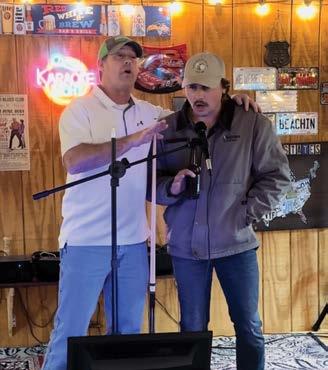





















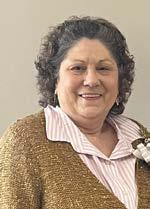




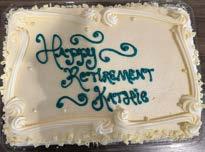


Coahoma Electric celebrated recent retirees on Feb. 29, 2024, for their outstanding work and service to the cooperative over the years. A luncheon was held featuring steak, baked potatoes, salad, cake, and ice cream.




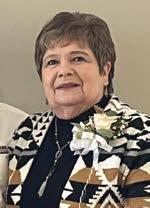







Four Coahoma Electric linemen completed Transformer Training School on Feb. 7 and 8.


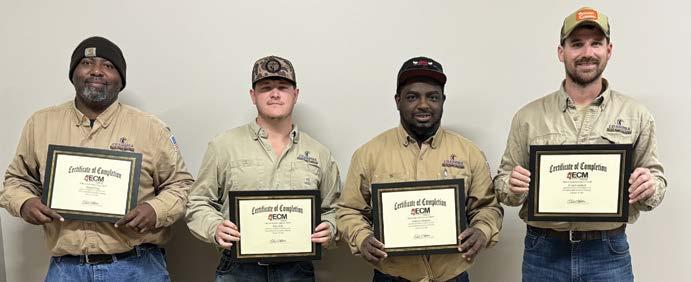 Kathie Serio HEAD BOOKKEEPER 24 years
Zelda Lawrence ENGINEERING CLERK 18 years
Ahmad Price APPRENTICE LINEMAN 1 YEAR
John Hall APPRENTICE LINEMAN 1 YEAR
Anthony Simpson APPRENTICE LINEMAN 2 YEARS
Kathie Serio HEAD BOOKKEEPER 24 years
Zelda Lawrence ENGINEERING CLERK 18 years
Ahmad Price APPRENTICE LINEMAN 1 YEAR
John Hall APPRENTICE LINEMAN 1 YEAR
Anthony Simpson APPRENTICE LINEMAN 2 YEARS

















You probably don’t think about them until your power goes out, but electric lineworkers protect our homes and communities 24 hours a day. Like other first responders who keep us safe, lineworkers endure all kinds of weather and challenging conditions.
In April, we celebrate Lineworker Appreciation Month to honor the men and women who power our lives. Here are some quick facts about lineworkers and the work they do.

Lineworkers first appeared during the 1840s rush to spread telegraph service across the U.S., stringing wires between trees and other natural objects. It didn’t take long for everyone to realize tall poles were safer and more practical.
Restoring electricity after a power outage is just one of the many duties of lineworkers, who also:
• Install and connect new power lines to homes and businesses
• Maintain and perform upgrades to improve our electric grid
• Diagnose and pinpoint power delivery issues
• Plan and manage large-scale projects
• Ensure safe work practices in often challenging conditions
Lineworkers are responsible for maintaining and upgrading the nation’s electric grid that connects more than 7,300 power plants to 145 million consumers through 60,000 miles of high-voltage lines, millions of miles of distribution lines and more than 50 million transformers.
Lineworkers climb with up to 40 pounds of safety gear and tools. That’s like carrying a 5-gallon water jug! Here’s what they typically wear to stay safe while working:
• Hard hats
• Safety glasses
• Flame-resistant clothing
• Arc flash protective clothes
• Rubber gloves & sleeves
• Climbing belts
• Fall-protection harnesses
One essential tool for lineworkers is the hot stick, an insulated fiberglass pole used to safely move energized wires and other equipment. Hot sticks vary in size depending on the job.
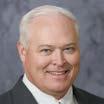 President and CEO by Ron Barnes
President and CEO by Ron Barnes

Squirrels and snakes are a major cause of power outages, and lineworkers encounter plenty of both while working. When your o ce is the great outdoors, these encounters are part of the job.
The Energy Department describes lineworkers as one of the nation’s highest-paid professions that doesn’t demand postsecondary education. Becoming a journeyman lineworker typically requires a high school diploma or equivalent, training and a paid apprenticeship, which typically spans four years. Apprentice lineworkers receive hands-on training and experience in the field before advancing to “journeyman” status.
Roughly 60,000 lineworkers hit the road annually to respond to devastating storms and the damage they leave behind. In addition to extreme weather exposure, lineworkers face a variety of dangers, including electric shock, falls from elevated work locations and roadside tra c accidents. High injury rates among early lineworkers led to the creation of apprenticeship programs.
Safety is always the number one priority, which is why lineworkers continuously receive training to stay mindful of safety requirements and up to date on the latest equipment and procedures.
Coast Electric linemen power our lives. The next time you see one, remember to thank them for the essential work they do.









A group of 85 high school juniors from all over the state gathered in Jackson from Feb. 21 to Feb. 23 for the 37th Electric Cooperatives of Mississippi Cooperative Leaders Workshop.
The program instills leadership skills, inspires creative thinking, encourages community service, and introduces students to legislative elected o cials from their communities.
The conference was held at The Westin in downtown Jackson.
The students earned the trip to the workshop following a competitive selection process sponsored by their local electric cooperative. They will travel to Washington, D.C., in June for a seven-day youth leadership tour.
Coast Electric students Ella Fontan, Jackson Pearce, Marley Freeman and Satvik Kompella spent the three days in Jackson with other students from around the state. They met with their state lawmakers, toured the state capitol, participated in problem-solving activities and attended speeches by motivational speakers — including one by political cartoonist Marshall Ramsey — who urged them to serve their communities.
Lt. Gov. Delbert Hosemann and Secretary of State Michael Watson spoke to the students during the workshop.



To the members of Coast Electric,
Thank you for being part of this co-op and giving us the opportunity of a lifetime. These three days have been filled with new friendships, learning about our state government and important leadership moments. Without y’all, none of this could have been possible.
Sincerely,
Ella Fontan, Marley Freeman, Satvik Kompella and Jackson Pearce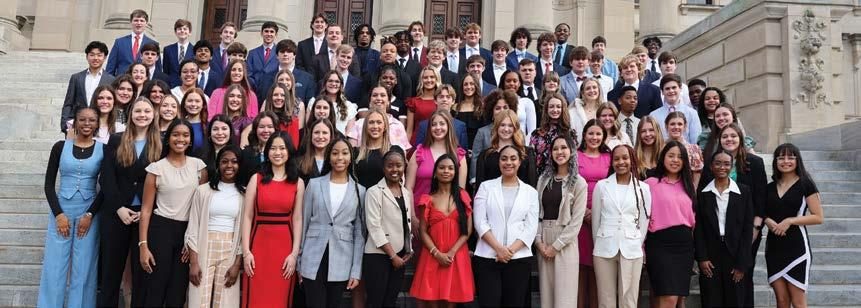



Coast Electric wants you to reduce your energy use and see savings on your energy costs. Each month, you will have an opportunity to register to win a prize that will help you reduce the energy consumption in your home. Visit www.coastelectric.coop or scan the QR code to enter. It only takes a few seconds, and you could win a prize that helps you save!
Congratulations to our February Reduce Your Use winner, Denise Neely.























You probably don’t think about them until your power goes out, but electric lineworkers protect our homes and communities 24 hours a day. Like other first responders who keep us safe, lineworkers endure all kinds of weather and challenging conditions.
In April, we celebrate Lineworker Appreciation Month to honor the men and women who power life. Here are some quick facts about lineworkers and the work they do.
Lineworkers first appeared during the 1840s rush to spread telegraph service across the U.S., stringing wires between trees and other natural objects. It didn’t take long for everyone to realize tall poles were safer and more practical.
Restoring electricity after a power outage is just one of the many duties of lineworkers, who also:
• Install and connect new power lines to homes and businesses
• Maintain and perform upgrades to improve our electric grid
• Diagnose and pinpoint power delivery issues
• Plan and manage large-scale projects
• Ensure safe work practices in often challenging conditions Lineworkers are responsible for maintaining and upgrading the nation’s electric grid that connects more than 7,300 power plants to 145 million consumers through 60,000 miles of high-voltage lines, millions of miles of distribution lines and more than 50 million transformers.
Lineworkers climb with up to 40 pounds of safety gear and tools. That’s like carrying a 5-gallon water jug! Here’s what they typically wear to stay safe while working:
• Hard hats
• Safety glasses
• Flame-resistant clothing
• Arc flash protective clothes
• Rubber gloves & sleeves
• Climbing belts
• Fall-protection harnesses
One essential tool for lineworkers is the hot stick, an insulated fiberglass pole used to safely move energized wires and other equipment. Hot sticks vary in size depending on the job.

Squirrels and snakes are a major cause of power outages, and lineworkers encounter plenty of both while working. They’ve also been known to rescue kittens that climbed too high in a tree and curious bears on top of utility poles. When your o ce is the great outdoors, these encounters are part of the job.
Described by the Energy Department as one of the nation’s highestpaid professions that doesn’t demand postsecondary education, becoming a journeyman lineworker typically requires a high school diploma or equivalent, training and a paid apprenticeship, which typically spans four years. Apprentice lineworkers receive hands-on training and experience in the field before advancing to “journeyman” status. Lineworker salaries range from $40,000 to $144,000, depending on location, skillset and experience.
Roughly 60,000 lineworkers hit the road annually to respond to devastating storms and the damage they leave behind. In addition to extreme weather exposure, lineworkers face a variety of dangers, including electric shock, falls from elevated work locations and roadside tra c accidents. High injury rates among early lineworkers led to the creation of apprenticeship programs and organized labor throughout the industry.
Safety is always the number one priority, which is why lineworkers continuously receive training to stay mindful of safety requirements and up to date on the latest equipment and procedures.
Lineworkers power our lives. The next time you see one, remember to thank them for the essential work they do.















David O’Bryan will retire as Delta Electric’s general manager and as Delta Fiber’s chief executive o cer on April 26 after a career spanning 32 years at the electric cooperative.
O’Bryan was hired on March 16, 1992, as controller and was elected secretary-treasurer for the association in 2002. On June 6, 2015, O’Bryan succeeded Ronnie Robertson as the fourth, full-time general manager in Delta Electric’s 86-year history. During his tenure as general manager, the cooperative has continued to emphasize high-quality customer service, system reliability, and outage management.
“Another of my highest priorities has been the safety of our employees and we have continued to stress the importance of our accredited safety program,” O’Bryan said. A major accomplishment during his time as general manager has been the provision of fiber broadband services through Delta Electric’s wholly owned fiber broadband subsidiary, Delta Fiber LLC doing business as DE LightSpeed.
“With the help of our local legislators, the Mississippi Broadband Enabling Act was passed that allowed us to enter the broadband business for the first time,” he said. Delta Fiber LLC was established in 2019 and with the help of employees, outside consultants and contractors, Delta Electric began its initial fiber optic construction project in Carroll County in 2020 that was funded by a CARES Act grant in the amount of $4.9 million. Delta Fiber LLC then won FCC Rural Digital Opportunity Fund grant funding during 2021 in the amount of $46.9 million that is spread over 10 years, allowing it to expand its fiber broadband service to other parts of Carroll


County along with parts of Holmes, Grenada, Leflore, and Montgomery counties. Symmetrical broadband services are o ered at speeds up to 1,000 megabits per second or Gigabit speed internet service.
“This has certainly been one of the most rewarding times of my career as we are now providing world-class, ultra highspeed fiber internet service to our members at a ordable prices,” O’Bryan explained. “Delta Fiber LLC plans to expand its broadband services to Bolivar, Sunflower, and Washington counties over the next 3 to 4 years,” he said.
O’Bryan is a native of Winona and a graduate of the University of Mississippi with an accounting degree. He is a Lyceum Life Member of the University of Mississippi Alumni Association. He holds professional designations as a Certified Public Accountant and Chartered Global Management Accountant. He also has memberships in the Mississippi Society of CPAs and the American Institute of CPAs. His local professional activities include serving on the executive board of the Greenwood-Leflore Industrial Board, the GreenwoodLeflore-Carroll Economic Development Foundation board, the Carroll County Development Association board, and the Mississippi Economic Council Board of Governors. He is also president of the McCarley Water Association Board of Directors, a former president of the Greenwood Kiwanis Club, and is active in Delta Council. His industry activities have included service on the Cooperative Energy Board of Directors and as its budget committee chairman. Cooperative Energy is Delta Electric’s generation and transmission
cooperative headquartered in Hattiesburg. He also served on the board of the Electric Cooperatives of Mississippi along with various committee assignments. O’Bryan also served on the executive committee and as secretary-treasurer of MS Fiber LLC, a Middle-Mile internet transport company headquartered in Ridgeland.
He and his wife, Lou, live in the McCarley community of Carroll County where they are active members of McCarley Baptist Church. They have two married children, Andy (Macon)
of Oxford and Brad (Monica) of McCarley and they have three granddaughters, Ava Elizabeth, Ainslee Marie, and Maren Hart.
“I want to thank the Delta Electric and Delta Fiber LLC boards of directors along with our amazing employees for their support during my time at Delta Electric,” O’Bryan said.
“It’s been an incredible journey and I am forever grateful for the opportunity. I have made many friends for life, and I look forward to more time with Lou and our family, along with opportunities for travel and projects on our farm.”










The Delta Electric Power Association Board of Directors has named Harold Pittman to succeed David O’Bryan as general manager. Pittman, Delta EPA’s assistant general manager and chief engineer, will assume his new duties on April 26. A 1989 graduate of Winona Academy, Pittman earned a Bachelor of Science degree in electrical engineering from Mississippi State University in 1993. Pittman also earned his professional engineer license in 2000, and a master’s degree in business administration from Delta State University in 2002. Before joining the Delta EPA sta in 1995, Pittman worked as a manufacturing engineer for Takata Restraint Systems. During his tenure at Delta EPA, Pittman has served as system engineer, district manager, chief engineer, and assistant

general manager. Pittman plans to focus on continuing to provide the best service at the lowest cost possible.
“I plan on leveraging technology and retaining good employees to keep our quality of service at the level our members expect,” Pittman said.
“I know that Delta Electric and Delta Fiber will be in good hands with Harold as my successor. He has many years of experience and is well respected by his peers and our employees,” said David O’Bryan.
Pittman and his wife, Alison, live in Carroll County. They have two children, Mary Evelyn and Samuel. They are active members of North Greenwood Baptist Church.





$3,705,000
On May 10, 2024, Delta Electric Power Association will mail refund checks to members, as the cooperative has done for the past 34 years. These capital credit refund checks will be mailed to all members who received a bill from Delta Electric during the years 1999 and 2023.

allocations from Cooperative Energy, Delta Electric’s generation and transmission cooperative, headquartered in Hattiesburg.
Any unpaid bills will be recovered prior to issuance of the checks.

The operating margin refund in the amount of $3,000,000 will be 50% of 1999 operating margins along with approximately 18.6% of 2023 operating margins.
“In addition, we are pleased to announce that 100% of nonoperating margins for 1994 in the amount of $705,000 will be included in this refund,” said David O’Bryan, general manager. Delta Electric’s non-operating margins consist solely of margin







Since 1989, when the first capital credit refunds were made, and including this year’s refund, Delta Electric has returned to members a total of almost $82 million.

Unlike an investor-owned utility, which is operated for profit, Delta Electric is a cooperative and does not operate on a profit basis. Each bill a member pays goes toward the funding of the cooperative. All revenue is used to operate, maintain, and improve the cooperative for the benefit of its members. Any revenue received in excess of expenses is allocated back to members for future retirement.





















is an equal
“Powering communities and empowering lives”


After Hurricane Sandy hit the United States in 2012, the 113th Congress passed a bill designating April 18 as National Lineman Appreciation Day. The bill later became law in 2013. At Dixie Electric, we value our team of skilled linemen, and I want to take this opportunity to recognize them for the work they do.
You might be wondering, why do we have a whole day dedicated to linemen? First, linemen are the backbone of our electric cooperative. Utility lineworkers rank as one of the top 10 most dangerous professions. They brave the elements, often working in dangerous conditions, to ensure that our members stay connected and to restore power to our homes and communities. Linemen must be aware of their surroundings and the safety of the person next to them. Their work requires concentration, and there is no margin for error, so we’ve worked to build a culture of trust, teamwork, and service.
It’s not just during emergencies that our linemen make a di erence. They stand ready to power every moment of your day, every day. They maintain our infrastructure, complete upgrades to our system, and ensure that we deliver safe and reliable electricity to our members. Their work is physically demanding, including loading heavy materials, climbing poles and in and out of bucket trucks, often carrying 40 pounds or more of personal protective equipment with them.
Linemen also spend thousands of hours training and learning throughout their career. Their dedication is nothing short of extraordinary and a testament to their commitment to powering our
local communities. Our linemen continuously receive training to stay mindful of safety requirements and up to date on the latest equipment and procedures.
In addition to their skills and expertise, linemen also embody the spirit of community. Whether it’s volunteering their time to assist with local events or going above and beyond to help a member in need, our linemen truly exemplify what it means to be part of a cooperative community. They sacrifice sleep, holidays, and, more than anything, time with family. And especially for those with younger families, they miss ball games, school events, family gatherings, and watching their kids grow up, to keep your lights on because they know that you depend on them.
To our linemen – thank you for your service, your sacrifice, and your steadfast dedication to our members. You are the unsung heroes of our community, and we are incredibly grateful for everything you do.









A group of 85 high school juniors from all over the state gathered in Jackson from Feb. 21 to Feb. 23 for the 37th Electric Cooperatives of Mississippi Cooperative Leaders Workshop.
The program instills leadership skills, inspires creative thinking, encourages community service, and introduces students to legislative elected o cials from their communities.
The conference was held at The Westin in downtown Jackson.
The students earned the trip to the workshop following a competitive selection process sponsored by their local electric cooperative. They will travel to Washington, D.C. in June for a seven-day youth leadership tour.




Dixie Electric students Baylee Powell, Drake Frasier, and Ethan Nguyen spent the three days in Jackson with other students from around the state. They met with their state lawmakers, toured the state capitol, participated in problem solving activities, and attended speeches by motivational speakers — including one by political cartoonist Marshall Ramsey — who urged them to serve their communities.
Lt. Gov. Delbert Hosemann and Secretary of State Michael Watson spoke to the students during the workshop.



























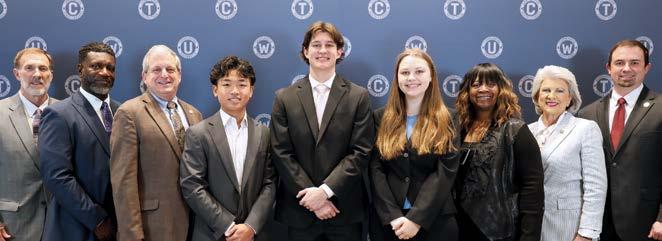














We can help you select the internet plan that’s “eggsactly” right for your nest. Get linked at DEFastlink.net.
Dixie Electric Power Association clears trees, limbs, and underbrush from the area around and below the power lines, called the right-of-way. Right-of-way clearing decreases the number of outages and reduces the risk of someone coming in contact with the power lines. Clearing the right-of-way protects individuals from the hazards of electricity and makes power restoration quicker and safer for both Dixie Electric’s members and personnel. CLEARING
Cleo: Cleo, Poole Creek, Mill Creek, Strengthford, Myrick
Glade: Glade, Myrick, Tuckers Crossing, North Jones
Old Augusta: New Augusta, Leaf River Sawmill Pole inspections are underway

Osmose Utilities Services, EXO, and Utility Asset Management will be performing inspection and maintenance on some of Dixie Electric Power Association’s poles this year. The process began in February and will continue for approximately four months. The general areas to be inspected will be Shady Grove, Hoy, Calhoun, Sharon, Sandersville, Cleo, Powers, Myrick, Glade, and Pendor .
This work will generally consist of excavating a hole about 18” deep around the poles to inspect them and applying a preservative and/or remedial treatment to the poles as needed. The purpose of the inspection and treatment is to identify poles that do not meet industry strength standards and to extend the useful life of all others.
All contract workers will be identifiable by their yellow and orange work vests and hard hats. Contract vehicles should be marked with their respective company decals as well as Dixie Electric Power Association “Contractor” decals.



























You’ve likely noticed East Mississippi Electric Power Association’s crews out and about, working on power lines and other electrical equipment in our community. It’s no secret that a lineworker’s job is tough, but it’s a job that’s essential and must be done, often in challenging conditions. This month, as we celebrate Lineworker Appreciation Day on April 18, I thought I’d share some interesting facts about electric lineworkers with you.
The work can be heavy, in more ways than one. Did you know the equipment and tools that a lineworker carries while climbing a utility pole can weigh up to 50 pounds? That’s the same as carrying 6 gallons of water. Speaking of utility poles, lineworkers are required to climb poles ranging anywhere from 30 to 120 feet tall. Needless to say, if you have a fear of heights, this likely isn’t the career path for you.
Lineworkers must be committed to their career — because it’s not just a job, it’s a lifestyle. The long hours and ever-present danger can truly take a toll. In fact, being a lineworker is listed in the top 10 most dangerous jobs in the U.S.
Lineworkers often work all hours of the day and night, outdoors in di cult conditions. The lineworker job requires years of educational study, honing of technical skills and hands-on apprentice training. Did you know that becoming a journeyman lineworker can take more than 7,000 hours of training — about four to six years? That’s because working with high-voltage equipment requires specialized skills, experience, and physical and mental toughness. Shortcuts are not an option, and there is no room for error in this line of work.
Despite the many challenges, EMEPA’s lineworkers are committed to powering our local community. During severe weather events that bring major power outages, lineworkers are among the first














ones called. They must be ready to leave the comfort of their homes and families unexpectedly, and they don’t return until the job is done, often days later. That’s why the lineworker’s family is also dedicated to service. They understand the importance of the job to the community.
EMEPA’s lineworkers are responsible for keeping power flowing 24/7, 365 days a year across 5,768 miles of power lines in four primary counties and portions of five others. Today’s lineworkers are information experts who can pinpoint power outages from miles away. Line crews now use laptops, tablets, and other technologies to more quickly map outages, survey damage, and troubleshoot problems.
Lineworkers are essential to the quality of life in our communities. Without the exceptional dedication and commitment of these hardworking lineworkers, we simply would not have the reliable electricity that you expect every day.
So, the next time you see a lineworker, please thank them for the work they do to keep power flowing, regardless of the time of day or weather conditions. While we have many support personnel as well, lineworkers are our most visible employees driving our Powerful Di erence. Please join us as we recognize them on April 18, and follow #ThankALineworker on social media to see how others are recognizing lineworkers.
 by Randy Carroll
CEO — East Mississippi Electric Power
by Randy Carroll
CEO — East Mississippi Electric Power









A group of 85 high school juniors from all over the state gathered in Jackson from Feb. 21 to Feb. 23 for the 37th Electric Cooperatives of Mississippi Cooperative Leaders Workshop.
The program instills leadership skills, inspires creative thinking, encourages community service, and introduces students to legislative elected o cials from their communities.
The conference was held at The Westin in downtown Jackson.
The students earned the trip to the workshop following a competitive selection process sponsored by their local electric cooperative. They will travel to Washington, D.C. in June for a seven-day youth leadership tour.




East Mississippi Electric Power Association students Christian Hopson, Clay Miles, Erial Mays, LilyAnn Cooper, Paisley Ivey, and Sam Nance spent the three days in Jackson with other students from around the state. They met with their state lawmakers, toured the state capitol, participated in problem solving activities, and attended speeches by motivational speakers — including one by political cartoonist Marshall Ramsey — who urged them to serve their communities.
Lt. Gov. Delbert Hosemann and Secretary of State Michael Watson spoke to the students during the workshop.







You probably don’t think about them until your power goes out, but electric lineworkers protect our homes and communities 24 hours a day. Like other first responders who keep us safe, lineworkers endure all kinds of weather and challenging conditions. In April, we celebrate Lineworker Appreciation Month to honor the men and women who power life. Here are some quick facts about lineworkers and the work they do.
Lineworkers first appeared during the 1840s rush to spread telegraph service across the U.S., stringing wires between trees and other natural objects. It didn’t take long for everyone to realize tall poles were safer and more practical.
Restoring electricity after a power outage is just one of the many duties of lineworkers, who also:
• Install and connect new power lines to homes and businesses
• Maintain and perform upgrades to improve our electric grid
• Diagnose and pinpoint power delivery issues
• Plan and manage large-scale projects
• Ensure safe work practices in often challenging conditions
Lineworkers are responsible for maintaining and upgrading the nation’s electric grid that connects more than 7,300 power plants to 145 million consumers through 60,000 miles of high-voltage lines, millions of miles of distribution lines and more than 50 million transformers.
Lineworkers climb with up to 40 pounds of safety gear and tools. That’s like carrying a 5-gallon water jug! Here’s what they typically wear to stay safe while working:
• Hard hats
• Safety glasses
• Flame-resistant clothing
• Arc flash protective clothes
• Rubber gloves & sleeves
• Climbing belts
• Fall-protection harnesses
One essential tool for lineworkers is the hot stick, an insulated fiberglass pole used to safely move energized wires and other equipment. Hot sticks vary in size depending on the job.

Squirrels and snakes are a major cause of power outages, and lineworkers encounter plenty of both while working. They’ve also been known to rescue kittens that climbed too high in a tree and curious bears on top of utility poles. When your o ce is the great outdoors, these encounters are part of the job.
Described by the Energy Department as one of the nation’s highestpaid professions that doesn’t demand postsecondary education, becoming a journeyman lineworker typically requires a high school diploma or equivalent, training and a paid apprenticeship, which typically spans four years. Apprentice lineworkers receive hands-on training and experience in the field before advancing to “journeyman” status.
Roughly 60,000 lineworkers hit the road annually to respond to devastating storms and the damage they leave behind. In addition to extreme weather exposure, lineworkers face a variety of dangers, including electric shock, falls from elevated work locations and roadside tra c accidents. High injury rates among early lineworkers led to the creation of apprenticeship programs and organized labor throughout the industry.
Safety is always the number one priority, which is why lineworkers continuously receive training to stay mindful of safety requirements and up to date on the latest equipment and procedures.
Lineworkers power our lives. The next time you see one, remember to thank them for the essential work they do.
With a commitment to subscriber satisfaction, fair pricing and cutting-edge technology, East Mississippi Connect has become the go-to choice for residents seeking the best internet experience in East Mississippi.
East MS Connect is proud of its dedication to provide friendly, local service. Unlike larger, impersonal providers, East MS Connect prides itself on establishing strong connections with its subscribers. The emphasis on community-driven service ensures subscribers receive prompt and personalized assistance whenever needed.
East MS Connect believes in straightforward, fair pricing with no hidden fees or gimmicks. Subscribers enjoy the benefits of high-speed fiber internet without the worry of unexpected charges. Transparent pricing is just one way East MS Connect delivers exceptional value to its customers.
East MS Connect understands the importance of control and convenience in today’s connected world. The EMC Wi-Fi App, available for download on the Apple Store and Google Play, empowers users to take charge of their connected homes effortlessly. The key features of the app include:
• Manage smart devices and family profiles effortlessly.
• Customize and monitor your connected world with ease.
• Stay informed with a clear overview of all devices connected to your network.
• Identify and troubleshoot issues promptly for uninterrupted connectivity.
• Optimize performance with speed tests and prioritize devices for seamless connectivity.
For proof of East MS Connect’s excellence, look no further than our subscribers:
“Helps us during bad weather. We can keep up with storms online without worrying about the rain knocking out the internet.”
— Carol Bryan Rigdon“Fast and reliable, keeps my family connected and was a life-changer for homeschooling and entertainment!”
— Thaddeus E. Davis“Affordable with great customer service.”
— Tricia Robinson“Streaming period. We once were without. Now, we can stream. Amazing speed and a great value. Thank you, EMEPA!”
— Lisa Jenkins Mathis“Most reliable internet around ”
— Melanie Sampley Eakes
• Ensure your internet speed meets the demands of your connected lifestyle.
• Offer visitors hassle-free access while keeping your main network secure.
• Easily manage guest access settings for a secure and welcoming environment.
Household profiles and parental controls
• Customize a safe online environment for your family.
• Set up parental controls to manage screen time and control content access.
East MS Connect has established itself as the unrivaled provider of highspeed fiber internet in East Mississippi. With its local approach to customer service, transparent pricing and feature-rich EMC Wi-Fi App, East MS Connect sets the standard for excellence in internet service.















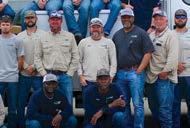
You probably don’t think about them until your power goes out, but electric lineworkers protect our homes and communities 24 hours a day. Like other first responders who keep us safe, lineworkers endure all kinds of weather and challenging conditions.
In April, we celebrate Lineworker Appreciation Month to honor the men and women who power life. Here are some quick facts about lineworkers and the work they do.
Restoring electricity after a power outage is just one of the many duties of lineworkers, who also:
• Install and connect new power lines to homes and businesses
• Maintain and perform upgrades to improve our electric grid
• Diagnose and pinpoint power delivery issues
• Plan and manage large-scale projects
• Ensure safe work practices in often challenging conditions Lineworkers are responsible for maintaining and upgrading the nation’s electric grid that connects more than 7,300 power plants to 145 million consumers through 60,000 miles of high-voltage lines, millions of miles of distribution lines and more than 50 million transformers.
Lineworkers climb with up to 40 pounds of safety gear and tools. That’s like carrying a 5-gallon water jug! Here’s what they typically wear to stay safe while working:
• Hard hats
• Safety glasses
• Flame-resistant clothing
• Arc flash protective clothes
• Rubber gloves & sleeves
• Climbing belts
• Fall-protection harnesses




Roughly 60,000 lineworkers hit the road annually to respond to devastating storms and the damage they leave behind. In addition to extreme weather exposure, lineworkers face a variety of dangers, including electric shock, falls from elevated work locations and roadside tra c accidents. High injury rates among early lineworkers led to the creation of apprenticeship programs and organized labor throughout the industry. Safety is always the number one priority, which is why lineworkers continuously receive training to stay mindful of safety requirements and up to date on the latest equipment and procedures.
Brett Abernathy
Bo Allen
Lonnie Ball
Nyles Branch
Kent Breland
Nathan Bullock
Dennis Butler
Wes Burns
Jett Calcote
Terry Causey
Corey Fletcher
Alex Fortenberry
Colby Fortenberry
Jacob Gill
Tanner Gunther
Matthew Hamilton
Tyler Hodges
Daniel Hollingsworth
Terry Jackson
Kasy Jenkins
Matt Lee
Samuel Mabile
Dorneail Magee
Jason Mallette
Chad Moak
Luke Morgan
Jonathan McCaskill
Stacy McCaskill
Jase Roberts
Torun Robinson
Dustin Rollinson
Logan Rushing
Adam Sandifer
Aaron Stewart
Justin Thomas
F'Daran Thompson
Jason Wilson
Paul Wilson
Andrew Wood









A group of 85 high school juniors from all over the state gathered in Jackson Feb. 21 to 23 for the 37th Electric Cooperatives of Mississippi Cooperative Leaders Workshop at The Westin in Jackson.
The program instills leadership skills, inspires creative thinking, encourages community service, and introduces students to legislative elected o cials from their communities.
The students earned the trip to the workshop following a competitive selection process sponsored by their local electric cooperative.
The group will travel to Washington, D.C. in June for a seven-day youth leadership tour.
Five winners were named from Magnolia Electric Power for this year’s Cooperative Youth Leaders program. The MEP winners are Da’Mya Edwards, Ann Elise Gatlin, Emme Barrett, Trent Owens, and Ariyanna Simmons.
During the three days the students spent in Jackson with other students from around the state, they met with their state lawmakers, toured the Capitol, participated in problem solving activities, and attended speeches by motivational speakersincluding one by political cartoonist Marshall Ramsey - who urged them to serve their communities.



The students also heard speeches by our governmental leaders including Lt. Gov. Delbert Hosemann and Secretary of State Michael Watson.
The MEP representatives also enjoyed a breakfast with their legislators and a group photo. Those legislators who attended the breakfast included: Sen. Jason Barrett, State Rep. Vince Mangold, and State Rep. Bill Pigott. Joining the group for a photo were the five winners, Barrett, Mangold, Piggott, and Sen. Albert Butler, Sen. Andy Berry, and Sen. Joey Fillingane.
While touring the Capitol on Thursday morning, the five students had the opportunity to catch up with State Rep. Becky Currie for a photo opportunity.
Other highlights for the MEP group: Mangold gave a personal tour of the floor of the House of Representatives and the group was given a photo opportunity at the House podium. Also, Barrett recognized the group from the Senate floor.
The MEP group also located a portrait of Ann Elise Gatlin’s greatgreat-grandfather, Dennis Murphree, who was a former two-time governor of Mississippi. Gatlin took a moment and had her photo taken with the portrait. The group also visited the Governor’s Protocol o ce located in the Capitol and found the legislator’s o ce that once served as the vault for the Mississippi State Treasury.


Magnolia Electric Power wants to thank all of our local legislators for always supporting our Cooperative Youth Leaders program.
Da’Mya Edwards, Ann Elise Gatlin, Emme Barrett, Trent Owens, and Ariyanna Simmons had the distinct opportunity to share an early morning breakfast with the legislators that included Sen. Jason Barrett, State Rep. Vince Mangold, and State Rep. Bill Piggott.
Unfortunately, we were not able to see all of our local legislators in Jackson, but we did catch up with State Rep. Becky Currie at the state capitol and had an opportunity to see several interesting locations inside.
We thank all of our legislators that have always supported this program! Thank you again to:
• Representative Angela Cockerham

• Representative Becky Currie
• Representative Je ery Harness
• Representative Vince Mangold
• Representative Sam Mims
• Representative Bill Piggott
• Representative Daryl Porter
• Senator Jason Barrett




• Senator Andy Berry
• Senator Gary Brumfield
• Senator Albert Butler
• Senator Joey Fillingane



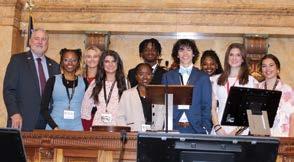




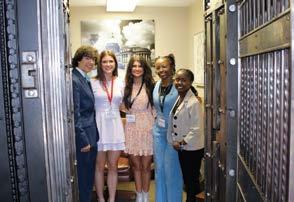
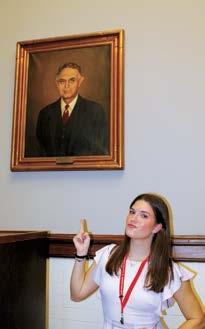

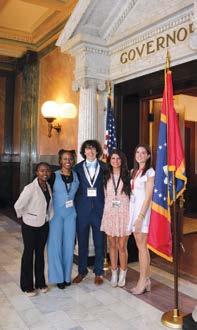














You probably don’t think about them until your power goes out, but electric lineworkers protect our homes and communities 24 hours a day. Like other first responders who keep us safe, lineworkers endure all kinds of weather and challenging conditions.
In April, we celebrate Lineworker Appreciation Month to honor the men and women who power life. Here are some quick facts about lineworkers and the work they do.
Lineworkers first appeared during the 1840s rush to spread telegraph service across the U.S., stringing wires between trees and other natural objects. It didn’t take long for everyone to realize tall poles were safer and more practical.
Restoring electricity after a power outage is just one of the many duties of lineworkers, who also:
• Install and connect new power lines to homes and businesses
• Maintain and perform upgrades to improve our electric grid
• Diagnose and pinpoint power delivery issues
• Plan and manage large-scale projects
• Ensure safe work practices in often challenging conditions Lineworkers are responsible for maintaining and upgrading the nation’s electric grid that connects more than 7,300 power plants to 145 million consumers through 60,000 miles of high-voltage lines, millions of miles of distribution lines and more than 50 million transformers.
Lineworkers climb with up to 40 pounds of safety gear and tools. That’s like carrying a 5-gallon water jug! Here’s what they typically wear to stay safe while working:
• Hard hats
• Safety glasses
• Flame-resistant clothing
• Arc flash protective clothes
• Rubber gloves & sleeves
• Climbing belts
• Fall-protection harnesses
One essential tool for lineworkers is the hot stick, an insulated fiberglass pole used to safely move energized wires and other equipment. Hot sticks vary in size depending on the job.

Squirrels and snakes are a major cause of power outages, and lineworkers encounter plenty of both while working. They’ve also been known to rescue kittens that climbed too high in a tree and curious bears on top of utility poles. When your o ce is the great outdoors, these encounters are part of the job.
Described by the Energy Department as one of the nation’s highestpaid professions that doesn’t demand postsecondary education, becoming a journeyman lineworker typically requires a high school diploma or equivalent, training and a paid apprenticeship, which typically spans four years. Apprentice lineworkers receive hands-on training and experience in the field before advancing to “journeyman” status. Lineworker salaries range from $40,000 to $144,000, depending on location, skillset and experience.
Roughly 60,000 lineworkers hit the road annually to respond to devastating storms and the damage they leave behind. In addition to extreme weather exposure, lineworkers face a variety of dangers, including electric shock, falls from elevated work locations and roadside tra c accidents. High injury rates among early lineworkers led to the creation of apprenticeship programs and organized labor throughout the industry.
Safety is always the number one priority, which is why lineworkers continuously receive training to stay mindful of safety requirements and up to date on the latest equipment and procedures.
Lineworkers power our lives. The next time you see one, remember to thank them for the essential work they do.




















 by Miranda Boutelle
by Miranda Boutelle
Earth Day is April 22, a time when we celebrate this beautiful planet we are lucky to call home. During this day of appreciation, I encourage you to take action at home by making changes to conserve energy. If we all contribute, even small adjustments and changes to how much energy we use can have positive impacts.
Electricity is essential to our daily lives. It gives us opportunities to learn, keeps us safe and comfortable, and provides entertainment. The downside is that every source of energy generation has consequences. Fossil fuels emit carbon. Hydropower dams limit the passage of migrating fish.
Even solar panels can’t be made without mining minerals. Using less electricity is a way to mitigate the impact of producing the electricity that powers our lives.
Before diving into ways to use less energy, it’s important to know the di erence between conservation and energy e ciency. Energy e ciency refers to equipment that uses less energy to do the same job. For example, ENERGY STAR®-certified refrigerators keep your food just as fresh as standard models but use about 9% less energy to do it, according to the U.S. Department of Energy. Conservation is using less energy by changing behavior and practices. For example, adjusting your thermostat to be closer to the temperature outside or turning o the lights or a ceiling fan when you leave the room conserves energy.

Let’s start with what’s typically the biggest energy user in the average household: heating, ventilation and air conditioning (HVAC) equipment. Save energy while you sleep by programming your thermostat to be a few degrees closer to the outside temperature at night. In colder climates, add an extra blanket or comforter to your bed to keep you warm.
Typically, the second biggest energy user is the water heater. Replacing an electric storage water heater with a heat pump/hybrid water heater is a great example of an energy e cient project. Adjusting the temperature setting to the recommended 120 degrees and using less hot water in your home conserves energy. Wash clothes in cold water. When washing dishes, don’t let the hot water run longer than necessary.
I am grateful for this planet we call home. It o ers so much to sustain us. Any small changes we can make to benefit the planet can add up if we all pitch in.
Earth Day also lends itself to thinking of ways we can connect with each other and limit our screen time. Look for electricity-free opportunities with your family or community. I like to unplug and get outside with friends and family. Going for a hike, a walk or even just spending time in your yard or local park is a great way to reconnect with others and nature. Before you head out, adjust that thermostat and turn o everything possible. Unplug chargers from outlets and turn o all electronics and lights.
Conservation has the best return on investment. It’s often free and can save a little or a lot — depending on what you are changing and how drastic of a change you make.
I am grateful for this planet we call home. It o ers so much to sustain us. Any small changes we can make to benefit the planet can add up if we all pitch in.
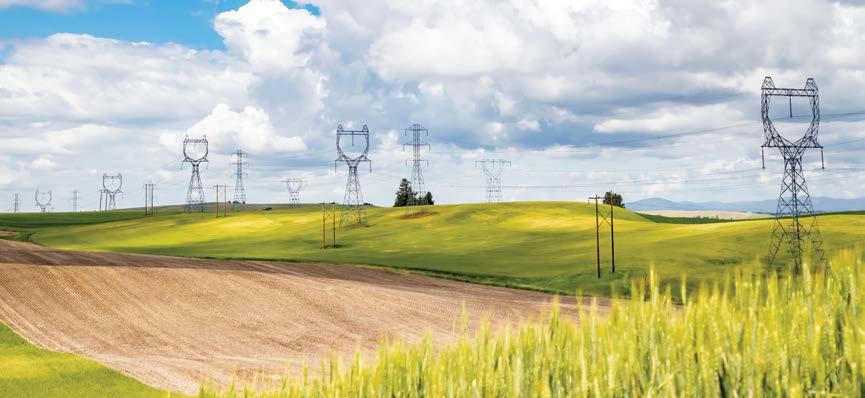
Change is a constant in today’s energy industry. Electric co-ops across the country are leaning into change as we explore new ways to meet tomorrow’s growing energy needs.
Electric co-ops play a crucial role in ensuring the lights come on every time Americans flip the switch. Our primary responsibility is to our members, and we remain committed to providing service that is both reliable and affordable. Energy policy has a profound impact on our ability to accomplish those goals and our national energy policies must embrace this fundamental promise.
The North American Electric Reliability Corporation (NERC), the watchdog for our nation’s grid, has issued several warnings about threats to grid reliability, warning that rolling blackouts could soon be the new norm. Nine states experienced blackouts in 2022 when electricity supply simply could not keep up with demand. And over the next five years, NERC forecasts that all or parts of 19 states from Montana to Louisiana are at high risk of rolling blackouts during normal peak conditions.
These warnings should not be taken lightly, which is why electric co-ops are pressing policymakers to recognize the need for time, technology development and new infrastructure, alongside policies that include a diverse mix of energy sources to maintain reliable power.
The economy of the future will be heavily reliant on electricity. From data centers and manufacturing to electric vehicles and electric heat pumps, the demand for electricity is set to rise dramatically. Co-ops are planning for this surge in demand by investing in infrastructure, technologies, and power supplies that will allow them to meet members’ needs, but additional challenges lie ahead.
Opposite this increasing demand for electricity, many power plants that generate always available electricity are being shut down without adequate replacements, posing a significant threat to reliability. The Environmental Protection Agency (EPA) is pursuing sweeping new regulations that would force the premature closure of always available power plants while also making it harder to permit, site, and build critical new plants. Electric co-ops have urged the EPA to withdraw these proposed regulations that would lead to more blackouts, higher costs, and uncertainty for Americans.
Electric co-ops are at the forefront of innovation and are already adapting to the unique needs of the members we serve. From community solar projects and energy efficiency programs to carbon capture and advanced nuclear generation, co-ops are leading the way.
Advocating for rational policies in Washington, D.C. that preserve reliability and affordability is crucial. This month, electric cooperative leaders will gather in Washington, D.C., for the annual Legislative Conference where they will meet with members of Congress and federal agencies to discuss key issues and concerns surrounding reliability. This allows co-ops to educate policymakers on the issues that matter most to the American families and businesses we serve.
Today’s energy decisions and policies will determine if there are enough resources to meet tomorrow’s energy needs. Electric co-ops will continue advocating for their members to ensure a reliable supply of electricity that powers everyday life.
Louis Finkel is the senior vice president of government relations for the National Rural Electric Cooperative Association.






















A group of 85 high school juniors from all over the state gathered in Jackson from Feb. 21 to Feb. 23 for the 37th Electric Cooperatives of Mississippi Cooperative Leaders Workshop.
The program instills leadership skills, inspires creative thinking, encourages community service and introduces students to legislative elected o cials from their communities.
The conference was held at The Westin in downtown Jackson.
The students earned the trip to the workshop following a competitive selection process sponsored by Natchez Trace Electric. They will travel to Washington, D.C. in June for a seven-day youth leadership tour.
Natchez Trace Electric students Emily Torres and JuKarion Conner spent the three days in Jackson with other students from around the state. They met with their state lawmakers, toured the state capitol, participated in problem-solving activities and attended speeches by motivational speakers — including one by political cartoonist Marshall Ramsey — who urged them to serve their communities.
Lt. Gov. Delbert Hosemann and Secretary of State Michael Watson spoke to the students during the workshop.











The Annual Meeting of the members of the Natchez Trace Electric Power Association (“Association”) will be held at 7 p.m. on April 22, 2024, in the Eupora High School Auditorium, Eupora, Mississippi.
Among the business to come before the members are (a) hearing and passing upon reports covering the previous fiscal year and (b) the election of three Directors.
Each member in good standing is entitled to one vote upon each matter submitted to vote at the meeting of members. A member may vote in person or by proxy through o cial mail ballot provided by the Association.
The Committee on Nominations are Perry Bailey, Calhoun City; Stan Blaylock, Eupora; Darrin Buggs, Houston; Billy M. Gore, Vardaman; Max Johnson, Mantee; Walter B. Meek III, Eupora; Leon Morris, Woodland; and Michael Watkins, Calhoun City. Submitted by members of the Association, this committee receives and considers nominees for Director. The Committee met in the Board Room at the Association’s Houston o ce, 551 East Madison Street, on February 5 for the purpose of selecting nominees considered for the Board. The Committee will prepare and post a list of their nominations for Board Members at the Houston, Calhoun City, and Eupora o ces of the Association at least 45 days before the Annual Meeting.
The Association’s Secretary mails with the notice of the Annual Meeting, or separately, a statement of the Board Members to be elected and the names and addresses of the candidates. Only those nominations made by the Committee, or by petition as hereinafter described, will be valid.











Any 50 members acting together may make nominations by petition and the Secretary will post such nominations at the same place where the list of nominations by the committee on nominations is posted. Any petition for nomination shall be submitted at least 45 days before the Annual Meeting on a form designated and provided by the Association. Each member signing such petition shall place thereon the date of signing, address, member’s number, and service location of the member. Nominations made by petition, if any, received at least 45 days before the meeting shall be included on the o cial ballot.
Notice is further given that three (3) directors are to be elected at the annual meeting and that the nominations for directors made by the Committee on Nominations and/or the Credentials and Elections Committee are as follows:
DISTRICT 1: Chickasaw and Pontotoc counties
Jackie Strong, incumbent, 1630 County Road 414, Houston, MS 38851
Glenn Huggins, 598 County Road 308, Houlka, MS 38850
James Lawrence, 144 County Road 106, Houston, MS 38851
DISTRICT 2: Webster and Clay counties
Joe Hays, 384 Carroll Street, Walthall, MS 39771
DISTRICT 3: Calhoun, Grenada, and Yalobusha counties
Jimmy Ball, 104 Susan Circle, Calhoun City, MS 38916
Return your ballot promptly for a chance to win a $500 credit for electricity. You do not have to be present at the Annual Meeting in order to win this prize.
Thanks to all of the members who voted their ballot last year. We need your ballot again this year in order to have a valid director’s election and annual meeting.
Please vote your ballot, sign it, seal it in the postage prepaid envelope, and return it to us. Please vote for one director in each district, three in total. Remember, you may win the $500 credit by doing so promptly.
Members can vote by mail or in person at the Annual Meeting. Members who vote by mail are also encouraged to attend the Annual Meeting. As noted above, members who vote by mail are eligible for a chance to win the $500 Credit. Members who also attend in person are eligible for a chance to win a $100 or $50 cash prize drawing. So, if a member votes by mail and attends the Annual Meeting in person, he/she has a double opportunity for winning a prize.
According to our Bylaws, three of our nine directors are elected every April. The process starts in Jan. when the Board appoints the Committee on Nominations, as well as the Credentials and Elections Committee. Though separate committees with entirely different functions, they are usually made up of the same persons. After the Nominating Committee is constituted, Natchez Trace publishes their names in the three principal papers within our service area, as well as its stating of the time and place of the Nominating Committee meeting.
This year the Nominating Committee members are: Perry Bailey of Calhoun City; Stan Blaylock of Eupora; Darrin Buggs of Houlka; Billy Mac Gore of Vardaman; Walter B. Meek III of Eupora; Leon Morris of Woodland; and Michael Watkins of Calhoun City. These same persons constituted the Credentials and Elections Committee.
The Association’s attorney announced that after the Nominating
Committee makes its decision as to the nominee or nominees for each of (the three) positions, we would post these at the three principal offices of the Association. If a member or group of members is unsatisfied with the Nominating Committee recommendations, there would be another opportunity for additional inputs as to board candidates, in the form of nomination by petition, until March 8, 2024.
After the committee members decided to separate the respective responsibilities of the Nominating Committee and of the Credentials and Elections Committee, the Committee on Nominations nominated the three incumbent directors whose respective slots were coming vacant to run again: Jackie Strong, incumbent, Houston, District One; nominated by petition, Glen Huggins, Houlka, District One; James Lawrence, Houston, District One; Joe Hays, Eupora, District Two; and Jimmy Ball, Calhoun City, District Three.

Jackie Strong has been a resident of Chickasaw County over 30 years. She is married to Hal Strong, and has 5 Children and 10 Grandchildren. She is currently employed by Nabors Home Center where she has worked for 20 years and is currently the Chief Operations Officer. She has devoted her time to family and community service, serving as a Sunday School Teacher at St. Matthew Church, in Houston. Strong is currently serving as a Board Member of PACE, and a Community Advocate for EXCEL by 5 for Chickasaw County. She is a member of Parents for Public Schools and helped to initiate the EARS program for Pre-K thru 3rd graders to help children in the Houston area that were under served. Strong served on the first Tourism Committee Board for two years. She also served as Houston High School Parent Liaison, and the Superintendent Community Focus Committee. Strong’s commitment has always been to help her children and community reach their full potential in education, opportunities, and affordable living.


Glenn Huggins
Glenn Huggins has been married to Shirley A. Huggins for 42 years, they have 5 children. Mr. Huggins finished school at Cornertstone Christian Correspondence School in Townsend, Georgia. Mr. Huggins has been the pastor of Trinity Outreach Center, in Trebloc, MS for 31 years and has served his community by serving on the boards of United Way and Salvation Army.
James Lawrence
James Lawrence has been a lifelong resident of Chickasaw County and a retired employee of Franklin Corporation in Houston, MS for 40 plus years, mostly in management. He is a member New Zion MB church, where he serves as a Sunday school teacher and a deacon. Lawrence has been active in the community for many years. He served as a school board member for several years and member of the advisory board for Bank of Mississippi for 5 years. He was also a member of Leadership of Chickasaw and a member of McIntosh Lodge #80 in Houston, MS. He is a proud graduate of Houston High School.

Joe Hays
Joe Hays is a candidate for director of District 2 in Webster and Clay counties. He is a lifelong resident of Webster County. Mr. Hays has completed his Credentialed Cooperative Director certification. He is a 1973 graduate of Eupora High School; he then continued his education at Mississippi State University, where he received a B.S. Degree in 1976 and his Masters Degree in Education in 1985. Mr. Hays worked in the Calhoun County and the Webster County school systems prior to his retirement and runs a cattle farm. Joe is a member of Walthall Baptist Church where he serves as Deacon. He is married to Angela James Hays and they have one son Zachary Hays of Flowood, MS and one granddaughter Karley James Hays.

Jimmy Ball is a candidate for director of District Three of Calhoun, Grenada, and Yalobusha counties. He has served on the Natchez Trace EPA Board since February 2002. He has received his Credentialed Cooperative Director certification. Jimmy presently serves as Vice-President of the Board. Jimmy is the son of the late Mr. and Mrs. Curtis Ball of Calhoun City. He and his wife Mary Lynn live in Calhoun City. He has two sons, Trey of Hernando and Wesley and wife Hillary of Oxford; step-son Cameron and wife Emily of Cabot, AR. and step-daughter Taylor and husband Troy Strunk of Fairhope, AL (Taylor works for Baldwin Electric Membership Corporation in Summerdale, AL). They have 6 grandchildren. Mr. Ball is a member of First Baptist Church in Calhoun City. He is owner of Ball Building Supply. Mr. Ball graduated from Calhoun City High School in 1966 and continued his education at Mississippi State University, receiving a B.S. Degree in 1970. He is an Eagle Scout and a vigil member of The Order of the Arrow and the Executive Board.
In accordance with Federal civil rights law and U.S. Department of Agriculture (USDA) civil rights regulations and policies, the USDA, its Agencies, offices and employees and institutions participating in or administering USDA programs are prohibited from discriminating based on race, color, national origin, religion, sex, gender identity (including gender expression), sexual orientation, disability, age, marital status, family/parental status, income derived from a public assistance program, political beliefs or reprisal or retaliation for prior civil rights activity, in any program or activity conducted or funded by USDA (not all bases apply to all programs).
Remedies and complaint filing deadlines vary by program or incident.
Person with disabilities who require alternative means of communication for program information (e.g., Braille, large print, audiotape, American Sign Language, etc.) should contact the responsible agency or USDA’s TARGET Center at 202-720-2600 (voice and TTY) or contact USDA through the Federal Relay Service at 800-877-8339. Additionally, program information may be made available in languages other than English.
To file a program discrimination complaint, complete the USDA Program Discrimination Complaint Form, AD-3027, found online at http://www.ascr.usda.gov/complaint_ filing_cust.html and at any USDA office or write a letter addressed to USDA and provide in the letter all of the information requested in the form. To request a copy of the complaint form, call 866-632-9992. Submit your completed form or letter to USDA by:
1. MAIL: U.S. Department of Agriculture
Office of the Assistant Secretary for Civil Rights 1400 Independence Avenue, SW Washington, D.C. 20250-9410;
2. FAX: 202-690-7442; or
3. EMAIL: program.intake@usda.gov
USDA is an equal opportunity provider, employer, and
Good Neighbors is a volunteer program designed to help – on a one time basis – families who fall on hard times and need help in paying their electric bill. NTEPA customers voluntarily agree to add at least one dollar per month to their electric bill as a contribution to this worthy cause. NTEPA collects and Community Action agencies administer this fund at no charge. Anyone interested in helping such families as a “Good Neighbor” please call 662-456-3037.












My appreciation for spring is widely known. It’s a quick transition from the winter doldrums to summer, and my love of the season tends to grow with each year. It’s a renewal of sorts, with blooming flowers and the promise of a winning baseball season. With limited availability of crawfish this year, I will appreciate the times we get together with family and friends over a few pounds even more than usual.
It’s also a season for us to show appreciation of those that deserve it for the jobs that they do. Engineers Week recognized a profession that touches virtually every industry and some folks that are vital to us in electric power. We will acknowledge our dedicated and hardworking linemen on April 18 for National Lineworker Appreciation Day. Administrative Professionals Day will be celebrated on April 24 to shine a light on the many contributions they make to the daily operations of the workplace. We have a diverse set of duties among the 125 employees of Northcentral, and all are greatly appreciated, not just on that day, but every day.
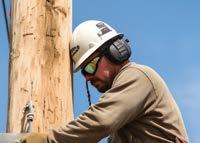

Stay safe.




We also appreciate our legislators, from the state capitol in Jackson to our congressmen and senators on the Hill. These men and women, along with their sta s, understand and support electric cooperatives. They see the need for diversity in energy resources and its importance in ensuring reliable and a ordable electric power for our members. I look forward to joining other coop leaders this month in Washington, D.C., to discuss our industry concerns around reliability.
by Kevin Doddridge General Manager/CEO






A group of 85 high school juniors from all over the state gathered in Jackson from Feb. 21 to Feb. 23 for the 37th Electric Cooperatives of Mississippi Cooperative Leaders Workshop.
The program instills leadership skills, inspires creative thinking, encourages community service, and introduces students to legislative elected o cials from their communities.
The conference was held at The Westin in downtown Jackson.
The students earned the trip to the workshop following a competitive selection process sponsored by their local electric cooperative. They will travel to Washington, D.C. in June for a seven-day youth leadership tour.





Northcentral Electric students Alexa Cooper, Derreneé Coleman, Epps Dye, Gri n England, John Haddakin, J.P. Woods, Kaylee Loden, Kiley Ward, Samara Hopper, Sarah Grace Niblett, Sydney Person, Vontrell Jones, and Zion Rucker spent the three days in Jackson with other students from around the state. They met with their state lawmakers, toured the state capitol, participated in problem solving activities, and attended speeches by motivational speakers — including one by political cartoonist Marshall Ramsey — who urged them to serve their communities.

Lt. Gov. Delbert Hosemann and Secretary of State Michael Watson spoke to the students during the workshop.





























Change is a constant in today’s energy industry. Electric co-ops across the country are leaning into change as we explore new ways to meet tomorrow’s growing energy needs.
Electric co-ops play a crucial role in ensuring the lights come on every time Americans flip the switch. Our primary responsibility is to our members, and we remain committed to providing service that is both reliable and affordable. Energy policy has a profound impact on our ability to accomplish those goals and our national energy policies must embrace this fundamental promise.
The North American Electric Reliability Corporation (NERC), the watchdog for our nation’s grid, has issued several warnings about threats to grid reliability, warning that rolling blackouts could soon be the new norm. Nine states experienced blackouts in 2022 when electricity supply simply could not keep up with demand. And over the next five years, NERC forecasts that all or parts of 19 states from Montana to Louisiana are at high risk of rolling blackouts during normal peak conditions.
These warnings should not be taken lightly, which is why electric co-ops are pressing policymakers to recognize the need for time, technology development, and new infrastructure, alongside policies that include a diverse mix of energy sources to maintain reliable power.
The economy of the future will be heavily reliant on electricity. From data centers and manufacturing to electric vehicles and electric heat pumps, the demand for electricity is set to rise dramatically. Co-ops are planning for this surge in demand by investing in infrastructure, technologies, and power supplies that will allow them to meet members’ needs, but additional challenges lie ahead.
Opposite this increasing demand for electricity, many power plants that generate always available electricity are being shut down without adequate replacements, posing a significant threat to reliability. The Environmental Protection Agency (EPA) is pursuing sweeping new regulations that would force the premature closure of always available power plants while also making it harder to permit, site, and build critical new plants. Electric co-ops have urged the EPA to withdraw these proposed regulations that would lead to more blackouts, higher costs, and uncertainty for Americans.
Electric co-ops are at the forefront of innovation and are already adapting to the unique needs of the members we serve. From community solar projects and energy efficiency programs to carbon capture and advanced nuclear generation, co-ops are leading the way.
Advocating for rational policies in Washington, D.C., that preserve reliability and affordability is crucial. This month, electric cooperative leaders will gather in Washington, D.C., for the annual Legislative Conference where they will meet with members of Congress and federal agencies to discuss key issues and concerns surrounding reliability. This allows co-ops to educate policymakers on the issues that matter most to the American families and businesses we serve.
Today’s energy decisions and policies will determine if there are enough resources to meet tomorrow’s energy needs. Electric co-ops will continue advocating for their members to ensure a reliable supply of electricity that powers everyday life.
Louis Finkel is the senior vice president of government relations for the National Rural Electric Cooperative Association.












Member owned. Locally operated. That’s the cooperative difference.


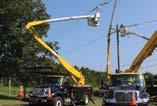
In our communities, there exists a group of individuals who works diligently to power our lives – our electric linemen. Every April 18th is National Lineman Appreciation Day, and we honor this group for their untiring dedication and teamwork. At Pearl River Valley Electric Power Association, we have linemen, servicemen, and many support personnel who work long hours to keep our members lights on. Whether it’s the daily grind of maintaining or building our infrastructure, or the awesome responsibility of restoring power after a major storm, these individuals are on the frontlines representing Pearl River Valley Electric.
When stormy nights roll in, while many of us seek refuge indoors, our linemen gear up, ready to face the challenges that come with ensuring our homes stay illuminated. Their job is far from ordinary, and in my many years at Pearl River Valley Electric, I have had the privilege of witnessing firsthand the profound impact of their work.
Electric linemen are the backbone of our communities, connecting us to the world with the simple flick of a switch. Their work extends beyond mere personal conveniences; it is about maintaining our way of life by ensuring that hospitals, schools, and homes are powered even when nature is at its most unpredictable.
Their job is not without its risks. Storms bring not only rain and wind but a host of hazards. Climbing towering poles, navigating









through flooded areas, and confronting high voltage electric lines are just a few of the challenges they willingly face. The dangers are real, but so is their commitment to getting the job done.
Individually our linemen can do amazing things, however it is their collective e ort that shows the power of teamwork. When hurricanes or tornadoes hit our service territory our linemen are faced with the monumental task of restoring power. In these moments our linemen come together as a unified force to re-energize our communities. They understand that each team member brings unique skills to the table, and together, they form an unstoppable force.
Many of you may know a lineman personally or see them working in our service territory. Take the time to thank them for their work. To our linemen, thank you for your steadfast commitment and incredible teamwork that powers our communities. We celebrate you.
 by Matthew Ware
CEO/General Manager
by Matthew Ware
CEO/General Manager

PearlComm Fiber, Pearl River Valley Electric Power Association’s fiber subsidiary, commemorated a major milestone in February, connecting its 10,000th customer.
To celebrate the occasion, employees of Pearl River Valley Electric Power Association and PearlComm Fiber presented Mrs. Elizabeth Entrekin of Baxterville with a $500 gift card.
“Before PearlComm I couldn’t get on the internet,” said Entrekin. “Now, I can enjoy streaming television, shopping, and reading. It has really improved life for those living in rural Mississippi.”
PRVEPA launched its 4,700 mile fiber-to-the-home (FTTH) project and fiber subsidiary, PearlComm Fiber, in 2021 and in the last three years, over 3,600 miles of line have been built putting the fiber company well ahead of its five-year-plan.
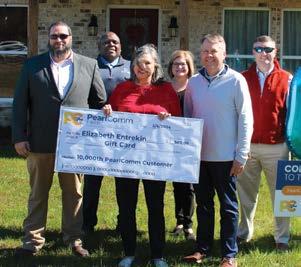








A group of 85 high school juniors from all over the state gathered in Jackson from Feb. 21 to Feb. 23 for the 37th Electric Cooperatives of Mississippi Cooperative Leaders Workshop.
The program instills leadership skills, inspires creative thinking, encourages community service, and introduces students to legislative elected o cials from their communities.
The conference was held at The Westin in downtown Jackson.
The students earned the trip to the workshop following a competitive selection process sponsored by their local electric cooperative. They will travel to Washington, D.C. in June for a seven-day youth leadership tour.





Pearl River Valley Electric students Mary Xie and Stevie Thompson spent the three days in Jackson with other students from around the state. They met with their state lawmakers, toured the state capitol, participated in problem solving activities, and attended speeches by motivational speakers — including one by political cartoonist Marshall Ramsey — who urged them to serve their communities.
Lt. Gov. Delbert Hosemann and Secretary of State Michael Watson spoke to the students during the workshop.













NOTICE OF THE ELECTION OF DIRECTORS, AND OF THE QUALIFICATIONS OF, AND THE MANNER OF QUALIFYING AS, A CANDIDATE FOR THE OFFICE OF DIRECTOR OF PEARL RIVER VALLEY ELECTRIC POWER ASSOCIATION
To: The Members of Pearl River Valley Electric Power Association
YOU ARE HEREBY NOTIFIED OF THE FOLLOWING:
Election of Directors for District 3, District 6, and District 8.
If you desire to be a candidate for the o ce of Director in one of the above Districts and if you meet the qualifications of Director as set forth below, then you may obtain an application in the form of a Petition for the candidacy to the Board of Directors at the o ce of Pearl River Valley Electric Power Association (hereinafter the “Association”), 1422 Highway 13 North, Columbia, Mississippi. You must obtain the signatures of at least fifty (50) members of the Association on the Petition for your nomination, and you must deliver the signed Petition to the o ce of the General Manager of the Association. The Association must receive the signed Petition no later than Friday, May 31, 2024. If your Petition is received by the Association by the above deadline then your Petition will be reviewed to determine compliance with this Notice and the applicable law and By-Laws of the Association. If the Petition is in such compliance, then your nomination will be placed before the members for a vote at the Annual Meeting of the Association to be held on the fourth Saturday in September 2024.
The qualifications for the o ce of Director of the Association are set out by Mississippi law and in the By-Laws of the Association and are as follows:
• Must be 21 years of age and have no felony convictions.
• Must be a member of the Association, receiving service therefrom at his or her primary residential abode and a resident of the district from which he or she is elected.
• May not be employed by or financially interested in a competing enterprise, or a business selling electric energy to the Association, or a business primarily engaged in selling electrical or plumbing appliances, fixtures or supplies to the members of the Association.
• May not be the incumbent or a candidate for any elective county, city, ward, beat, district, or state public o ce.
• May not be a close relative of a director or of an employee of the Association as defined in Section 4.14 of the By-Laws.
The information contained in this Notice concerning the qualifications of a Director and the means and manner of being nominated by Petition for the o ce of Director is a general summary only. The complete policy for Director election is available in the Association By-Laws which may be found on the Association’s website at www.prvepa.com In the event of a conflict between the summary set out herein and the actual law and By-Laws, the provisions of the law and the By-Laws shall control.

• Applications are available at PRVEPA o ces and at www.prvepa.com.
• Completed applications must be postmarked or emailed by Aug. 9.
• Scholarship recipients must be a PRVEPA member, spouse, or child of a member participating in the Round Up program.
• Recipients must be full time (12 hours or more per semester) freshmen students enrolled in academic or career-technical programs.
• Scholarship funds will be credited to each student’s college account — no checks will be issued to individuals.
• Scholarships should be awarded by the end of September. Students must be enrolled in good standing at the time funds are released to the colleges.

Funded by members who are rounding up their monthly bills, these scholarships are intended to assist students who will attend a Mississippi community college as a freshman this fall.
More information is available at www.prvepa.com.





















Pontotoc Electric employees participated in Pontotoc’s Touch-A-Truck event on March 2 at the Terry Chewe Sportsplex. PEPA was proud to support our community and brighten the day for our mini members!


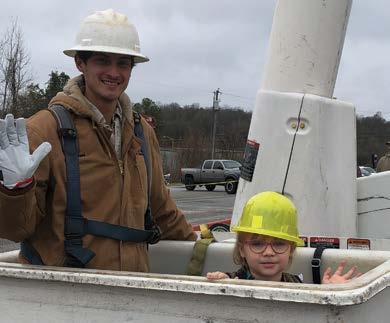


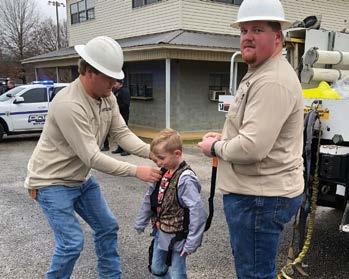


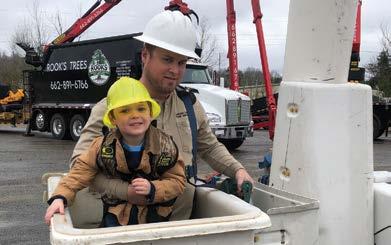










A group of 85 high school juniors from all over the state gathered in Jackson from Feb. 21 to Feb. 23 for the 37th Electric Cooperatives of Mississippi Cooperative Leaders Workshop.
The program instills leadership skills, inspires creative thinking, encourages community service, and introduces students to legislative elected o cials from their communities.
The conference was held at The Westin in downtown Jackson.
The students earned the trip to the workshop following a competitive selection process sponsored by their local electric cooperative. They will travel to Washington, D.C. in June for a seven-day youth leadership tour.




Pontotoc Electric students Hailey Hogan, John Allen Shaw, and Jonah Uithoven spent the three days in Jackson with other students from around the state. They met with their state lawmakers, toured the state capitol, participated in problem solving activities, and attended speeches by motivational speakers — including one by political cartoonist Marshall Ramsey — who urged them to serve their communities.
Lt. Gov. Delbert Hosemann and Secretary of State Michael Watson spoke to the students during the workshop.




That’s a perfect time to try out these yummy treats. Grab your basket, blanket, a few good friends, and enjoy some time in the spring air!


Curtis (PEPA Retiree) and Seretha Gregory
INGREDIENTS
4 sleeves saltine crackers
1 cup canola oil

1 package dry ranch dressing mix
1-2 tablespoon red pepper flakes

Mix oil, dressing mix, and red peppers well. Half the mixture. Mix half of the mixture with 2 sleeves of crackers and the other half of the mixture with the remaining 2 sleeves of crackers. Toss in bowl with hands. Cover bowl for 2 hours. Flip bowl over 1 turn every 15 minutes. Cover tightly.
INGREDIENTS
½ cup sugar
½ cup freshly squeezed lemon juice to every 3 cups of water Mix and serve.
This recipe belongs to my daughter, Dr. Jerri Lamar Kantack.
Kathy Stark, Collections Assistant/Receptionist
Jennifer Johnson, HR Manager
INGREDIENTS
2 tubes of refrigerated crescent rolls
1⁄3 cup sour cream

2 tablespoon dill weed
¾ cup match stick carrots
1 yellow bell pepper, diced

1 8-ounce package of cream cheese, room temperature
1 envelope dry ranch salad dressing mix
1 small head broccoli cut into small pieces
1 red bell pepper, diced
1 cucumber, diced
Preheat oven to 350 degrees as directed on crescent roll instructions. Spread crescent rolls across cookie sheet so it covers the entire sheet. Using your fingers, pinch perforations on crescent rolls to seal them together. Bake according to package directions. Cool completely before adding toppings.
In a medium bowl, add softened cream cheese, sour cream, ranch dip, and dill. Stir until fully mixed.
To assemble pizza: Spread ranch dill dip mixture all over baked and cooled crescent roll crust. Add chopped veggies. Cut into equal squares and serve.
INGREDIENTS
8 ounces cream cheese, softened
1 package ranch dip mix
1 package ham sandwich meat
1 package soft tortillas
Mix cream cheese and ranch dip mix together. Place ham on tortilla and spread mixture on slice of ham. Roll up tortilla. Do all the same. Place in fridge to cool, then cut them up.
Three PEPA employees recently advanced in the lineman apprenticeship program. Apprentice Lineman Erik Gentry moved up to Year Three in the program. Lineman Brandon Jenkins and Lineman Brandon Williams both advanced into the highest rank in the program: Journeyman Lineman. We appreciate their hard work through workbooks, written tests, and skills testing. Congratulations to all!







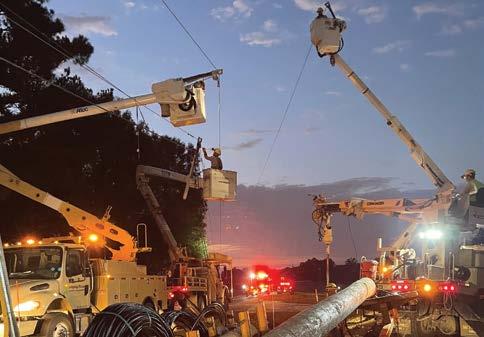
Line workers are highly skilled individuals who encounter some of the most challenging work conditions. Safety must remain a lineman’s primary focus, as his life and the lives of those who work with him depend on it. Daily, Singing River Electric linemen work with an element of danger that requires constant concentration, with no margin for error.
Many times, linemen work on or near energized lines with voltages of 7,620 volts up to 25,000 volts. The environment compounds the pressure, because in many instances, when our members need power the most is usually when the weather is at its worst. Linemen often find themselves working in rain, wind,

extreme heat and cold, in the dark, or on the side of the road next to fast-moving tra c.
A day in the life of a lineman is not so easy to predict. A lineman’s family plans are often altered due to unexpected power outages. SRE linemen receive calls all hours of the day and night, often requiring them to sacrifice precious family time to respond and restore electric service to our members – they do this willingly and without hesitation.
SRE linemen live and work in our local communities and take pride in serving our members. With April being National Lineman Appreciation Month, we say THANK YOU! The work our linemen do is definitely appreciated.
by Brian Hughey General Manager and CEO NEELY MCLEOD Marketing Specialist AMANDA PARKER, CCC Manager of PR and Marketing







With summer heat on the way, the best preparation for your home starts with making a phone call to your chosen HVAC (heating, ventilation, air conditioning) contractor. Ensuring your air conditioner is operating at the highest level of e ciency is vital to cutting down HVAC run time – and your electricity bill. I recommend having your HVAC system checked at least once a year. Issues that can lower the e ciency of a unit include low Freon, dirt on the outside or inside of coils, an inaccurate thermostat, duct leaks, and more. These issues can cause your HVAC system to experience longer overall operating times – longer run cycles require more energy, resulting in higher energy costs and decreased comfort.
If your unit needs Freon frequently or if you have other recurring issues, it may be time to consider replacing your HVAC system. Heat pumps are the most advanced and e cient cooling and heating systems available today. Part of Singing River Electric’s Comfort Advantage e ciency program for existing homes is a rebate program for replacing a electric or gas furnace with a new electric heat pump. Visit singingriver.com/my-home/comfortadvantage for more information.
Gabe Robbins Energy Services Representative robbins@singingriver.com


The Power Behind Your Power. Lineman Appreciation Month | April 2024
April 15-19 is National Work Zone Awareness Week.
If you’re traveling and see Singing River Electric linemen or Singing River Connect contractors working on the side of the road, we ask that you move over if possible and give them a little extra space to work. We deeply care about the safety of all, and this extra precaution ensures just that.
• If you approach a crew while traveling on a two-lane road, moving over to the next lane might not be an option. In this case, we ask you to slow down when approaching roadside crews.
• If you approach a crew while traveling on a four-lane road, and safety and tra c conditions allow, we ask that

you move over into the far lane. Mississippi’s “Move-Over Law” makes moving over a requirement. Utility crews aren’t the only ones who could use the extra space. Emergency responders, such as police o cers, firefighters, and emergency medical technicians often find themselves responding to emergency situations near busy roadways. Please follow the same procedures mentioned here to help keep these crews safe.



Singing River Electric clears trees, limbs and underbrush from the area around and below the power lines called the right of way. Right-of-way clearing helps decrease the number of outages and reduces the risk of someone coming in contact with power lines.
Here are the substations and surrounding areas that are either currently being cleared or where clearing will begin soon:

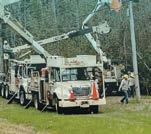









































Electric Cooperatives of Mississippi’s 2024 Cooperative Leaders Workshop held February 21-23 in Jackson, Miss.
While visiting Jackson with a total of 85 students from around the state, these young leaders networked with their peers through a get acquainted session and town hall meeting, participated in team-building exercises led by Elyon Outreach Ministries, and enjoyed an exciting evening with magician Dorian LaChance. The students also shared breakfast with senators and representatives from their districts, visited the Senate and House floors inside the Mississippi State Capitol, were addressed by Lieutenant Governor Delbert Hosemann during lunch at Old Capitol Inn, and listened to remarks from Secretary of State Michael Watson.
In June, the students will travel to Washington, D.C. for the National Rural Electric Cooperative Association's Youth Tour to visit our nation's historic landmarks and meet with Mississippi's senators and representatives.
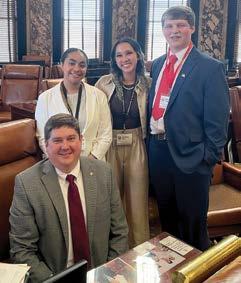







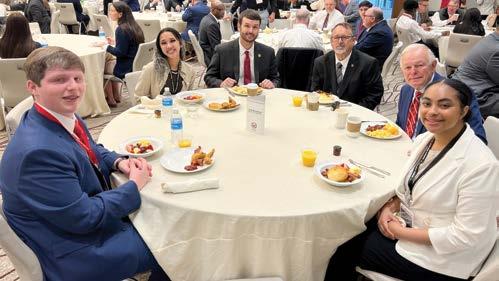


 Makayla-Jade Mendez from Pascagoula High School, Riley Tingle from Perry Central High School, and Vicky Vo from St. Martin High School represented Singing River Electric at the
A. Makayla-Jade, Vicky, and Riley on the Senate floor with Sen. Jeremy England. B. SRE’s students at the legislative breakfast with Rep. Elliot Burch, Sen. Mike Seymour, and Rep. and Speaker Pro Tempore Manly Barton. C. Riley speaks on behalf of his group during the town hall session. D. Vicky participates in a team-building exercise. E. Makayla-Jade assists magician Dorian LaChance with his act. F. SRE’s students learn about voting on the House floor with Rep. Steve Lott and Rep. Manly Barton.
Makayla-Jade Mendez from Pascagoula High School, Riley Tingle from Perry Central High School, and Vicky Vo from St. Martin High School represented Singing River Electric at the
A. Makayla-Jade, Vicky, and Riley on the Senate floor with Sen. Jeremy England. B. SRE’s students at the legislative breakfast with Rep. Elliot Burch, Sen. Mike Seymour, and Rep. and Speaker Pro Tempore Manly Barton. C. Riley speaks on behalf of his group during the town hall session. D. Vicky participates in a team-building exercise. E. Makayla-Jade assists magician Dorian LaChance with his act. F. SRE’s students learn about voting on the House floor with Rep. Steve Lott and Rep. Manly Barton.







Our members know that Southern Pine Electric linemen are heroes when storms roll through our area and cause power outages. They work in extreme weather conditions like ice storms, heavy winds, rain, and the brutal heat of a Mississippi August. When we need them, they leave their families at home, brave the conditions, and work tirelessly to restore power to our members. We are all extremely grateful to these men when we know that help is on the way and power will be restored soon.
But have you ever thought about what linemen do when there is no extreme weather and all members have power? The answer is they work hard every single day to keep our electric distribution system in top condition.
On bright days with clear skies our linemen complete maintenance work to ensure your distribution system is properly maintained and operating e ciently. They also work on system improvement projects and build new meter services to meet the growing demands of our communities.
These linemen are also the first responders when something goes wrong. They play a crucial role in ensuring we have safe and reliable power to our homes and businesses. Even though we might not see them every day, their work is essential in keeping our everyday lives powered up and running smoothly.
Linemen Appreciation Day is this month, and as we honor the work they do every day, rain or shine, let’s remember to always pray that they return home safely to their families after a safe day on the job.
 by Chris K. Rhodes
President/CEO Southern Pine Electric
by Chris K. Rhodes
President/CEO Southern Pine Electric
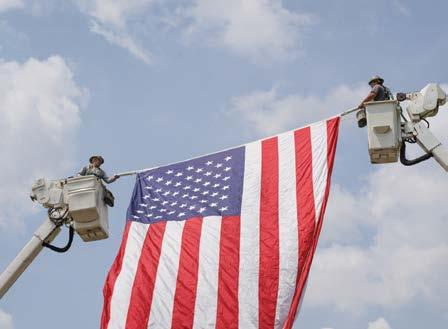





Every day is a great day to thank a lineman. Still, once a year, Lineman Appreciation Day is a day set aside for us all to remember our linemen and thank them for the dangerous work they do. Lineman Appreciation Day is April 18, and we are grateful to our Southern Pine linemen for their dedication to all members. These hardworking men consistently bring the power, rain or shine.
“When the power goes out, we can always count on our linemen’s courage, dedication, and skill to bring power back to our communities. Our linemen and linemen across our state truly deserve this special day of recognition for their commitment to keeping our communities powered,” said Chad Lewis, vice president of operations at Southern Pine Electric.




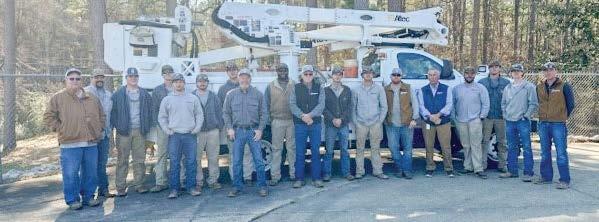

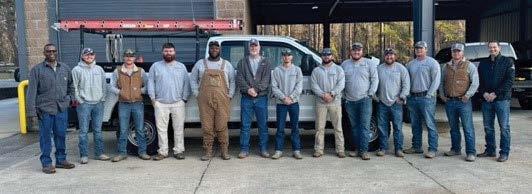


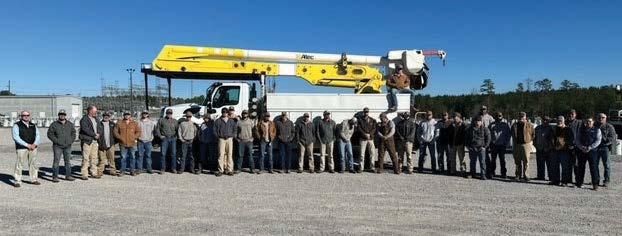
 Brandon District
Newton District
Taylorsville District
Brandon District
Newton District
Taylorsville District

Brandon Stringer wears many hats. He is a husband, father to three beautiful young children, a Southern Pine journeyman lineman, and a Sgt. First Class in the Mississippi National Guard. In 2023, he had to temporarily remove one of those hats when his unit was deployed to Fort Greely, Alaska, for nine months.
He joined the Southern Pine team in 2016 and is currently a journeyman lineman in the Taylorsville District. He loves his job. “I have had the privilege of working with some of the best in the business and building memories I will remember forever,” Brandon said. “At Southern Pine we are a family. My wife would probably agree that I spend more time with my work family than my own family, but that is part of the business. The relationships and bonds I built are like those I have built in my military career, which is why I enjoy this field of work.”
According to Kevin Amason, field supervisor, “Brandon is dedicated and holds all the core values that you look for in an employee. He has been an important part of Southern Pine in di erent areas, and he is always willing to help.” Kevin added that Brandon is an asset to Southern Pine and its mission.
Just like Brandon loves Southern Pine and his job, he also loves his country, so when called to serve, there was no hesitation. With his pregnant wife, Ashleigh, and two small children, Decklyn, 3, and Denton, 1, he knew it would not be easy for the family.


Brandon is the platoon sergeant at the 113th Military Police Company. Deployed in April 2023 to Fort Greely, his unit was tasked with working with the 49th Missile Defense Battalion, providing critical site security for a ground-based mid-course missile defense complex. At Fort Greely, he and his unit ran the daily operations of the missile defense complex, performing an array of duties around the site.
While Brandon was deployed, his family and his Southern Pine family missed him. “It was tough on my oldest, Decklyn, because she was old enough to know I wasn’t there, and she missed me,” said Brandon.
Brandon said he is grateful for Southern Pine, particularly his field supervisor, Kevin Amason, and district manager, Mike Kennedy. “When I was deployed, they were 100% supportive, and I appreciated that so much,” said Brandon. “I nominated both of them for the Patriot Award, and they were awarded it.” The Patriot Award is for employers who support their employees serving in the guard or reserve.
“We would like to thank Brandon for his dedication and hard work in serving our country, so we might continue to have the freedoms and opportunities we experience every day,” said Kevin. “During deployment, Brandon left some big shoes to fill. We thank all the employees who stepped up in his absence to keep things running smoothly.”
Brandon missed a lot while he was away serving his country. With small children that change and grow daily, his family’s sacrifice is immeasurable. In September, his wife went into labor, and he was granted a short leave to come home. However, he did not make it in time for the birth. “Denver was born about 15 hours before I arrived,” said Brandon.
His deployment ended in February 2024, and he is happy to be home. Brandon said it took him a little while to adjust to being home after his time in Alaska because it di ered from his day-to-day there. Still, he is grateful to be home in Stringer and back at Southern Pine. “I am so thankful for my family, my health, and my ability to work at a job I love,” he said.












The program instills leadership skills, inspires creative thinking, encourages community service, and introduces students to legislative elected o cials from their communities.
The conference was held at The Westin in downtown Jackson.
The students earned the trip to the workshop following a competitive selection process sponsored by their local electric cooperative. They will travel to Washington, D.C. in June for a seven-day youth leadership tour.
Southern Pine Electric students Jackie Sills, Michael Matte, Savanna Edwards, Perry Fletcher II, and Avery Daughdrill spent the three days in Jackson with other students from around the state. They met with their state lawmakers, toured the state capitol, participated in problem solving activities, and attended speeches by motivational speakers — including one by political cartoonist Marshall Ramsey — who urged them to serve their communities.
Lt. Gov. Delbert Hosemann and Secretary of State Michael Watson spoke to the students during the workshop.
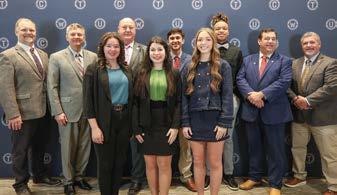























A group of 85 high school juniors from all over the state gathered in Jackson from Feb. 21 to Feb. 23 for the 37th Electric Cooperatives of Mississippi Cooperative Leaders Workshop.
The program instills leadership skills, inspires creative thinking, encourages community service and introduces students to legislative elected o cials from their communities.
The conference was held at The Westin in downtown Jackson.
The students earned the trip to the workshop following a competitive selection process sponsored by Southwest Electric. They will travel to Washington, D.C. in June for a seven-day youth leadership tour.
Southwest Electric students Ava Calcote, Avery Sellers, Peyton Bell and Xavien Felton spent the three days in Jackson with other students from around the state. They met with their state lawmakers, toured the state capitol, participated in problem-solving activities and attended speeches by motivational speakers — including one by political cartoonist Marshall Ramsey — who urged them to serve their communities.
Lt. Gov. Delbert Hosemann and Secretary of State Michael Watson spoke to the students during the workshop.


















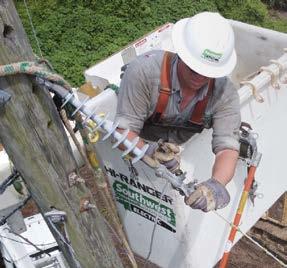









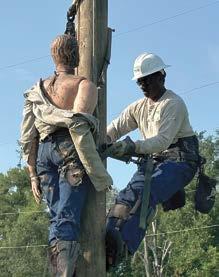




Lineworker Appreciation Month is a special time of the year when we come together to express our gratitude and admiration for the dedicated lineworkers at Southwest Electric. These brave individuals work tirelessly, often in challenging conditions, to ensure that our communities have a reliable supply of electricity. They are the unsung heroes who keep the power flowing and lights on, even during the most adverse circumstances. This month, we want to recognize and celebrate their hard work, commitment and unwavering dedication to serving our Members. Lineworkers are the backbone of our electrical infrastructure. They are the ones who climb towering poles, brave storms and work long hours to restore power during outages. Their expertise, skill and attention to detail are vital in maintaining and repairing our electrical systems. They go above and beyond to keep our homes, businesses and essential services powered, ensuring our safety and comfort. Their selflessness and willingness to put themselves in harm's way for the greater good deserve our utmost appreciation.
During Lineworker Appreciation Month, we encourage everyone to take a moment to acknowledge the incredible contributions lineworkers make to our daily lives. Whether it's a simple "thank you" or a gesture of support, let's show our gratitude and admiration for their hard work and sacrifice. Let's recognize the risks they undertake and the challenges they overcome to keep our communities energized and connected. At Southwest Electric, we are immensely proud of our lineworkers and extend our heartfelt appreciation to them for their service, professionalism and dedication.

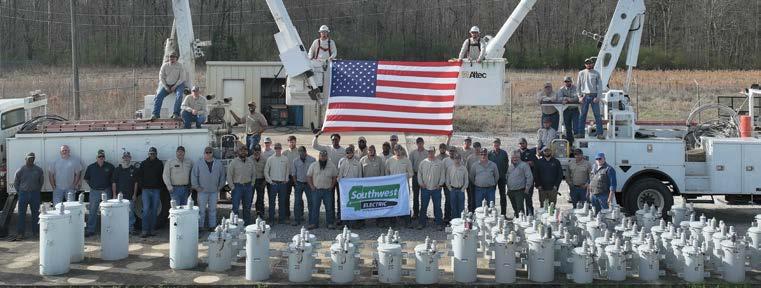




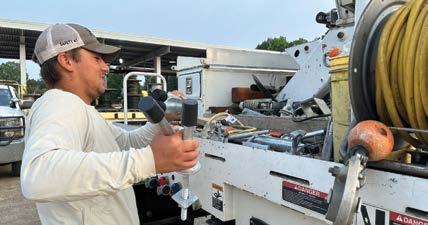

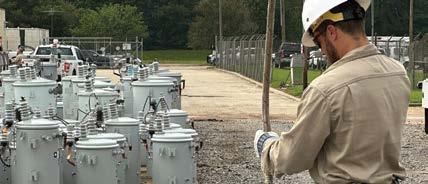

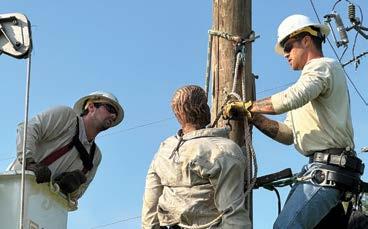

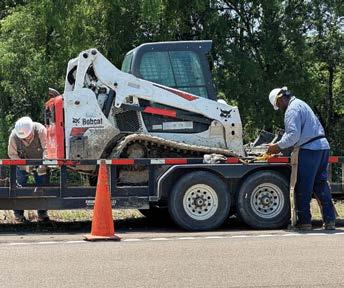
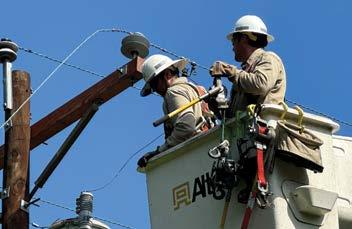


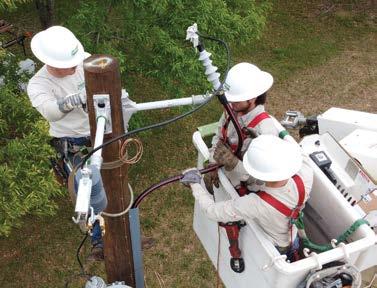



If you are planting a tree this spring, please plant so that the branches will not grow in the 40-foot right-of-way area around our poles and power lines.
SMALL/MEDIUM TREES 30-35 feet from lines
• Bradford Pear
• Dogwood
• Flowering Dogwood
• Ornamental Crabapple
• Plum
• Service Berry
• Cedar
• Fig
• Holly
• Persimmon
• Redbud
• Sourwood
• Walnut
• White Oak
• Cherry
• Cypress
• Hickory
• Pine
• Red Oak
• Sycamore • Willow
















You probably don’t think about them until your power goes out, but electric lineworkers protect our homes and communities 24 hours a day. Like other first responders who keep us safe, lineworkers endure all kinds of weather and challenging conditions. In April, we celebrate Lineworker Appreciation Month to honor the men and women who power life. Here are some quick facts about lineworkers and the work they do.
Lineworkers first appeared during the 1840s rush to spread telegraph service across the U.S., stringing wires between trees and other natural objects. It didn’t take long for everyone to realize tall poles were safer and more practical.
Restoring electricity after a power outage is just one of the many duties of lineworkers, who also:
• Install and connect new power lines to homes and businesses
• Maintain and perform upgrades to improve our electric grid
• Diagnose and pinpoint power delivery issues
• Plan and manage large-scale projects
• Ensure safe work practices in often challenging conditions Lineworkers are responsible for maintaining and upgrading the nation’s electric grid that connects more than 7,300 power plants to 145 million consumers through 60,000 miles of high-voltage lines, millions of miles of distribution lines and more than 50 million transformers.
Lineworkers climb with up to 40 pounds of safety gear and tools. That’s like carrying a 5-gallon water jug! Here’s what they typically wear to stay safe while working:
• Hard hats
• Safety glasses
• Flame-resistant clothing
• Arc flash protective clothes
• Rubber gloves & sleeves
• Climbing belts
• Fall-protection harnesses
One essential tool for lineworkers is the hot stick, an insulated fiberglass pole used to safely move energized wires and other equipment. Hot sticks vary in size depending on the job.

Squirrels and snakes are a major cause of power outages, and lineworkers encounter plenty of both while working. They’ve also been known to rescue kittens that climbed too high in a tree and curious bears on top of utility poles. When your o ce is the great outdoors, these encounters are part of the job.
Described by the Energy Department as one of the nation’s highestpaid professions that doesn’t demand postsecondary education, becoming a journeyman lineworker typically requires a high school diploma or equivalent, training and a paid apprenticeship, which typically spans four years. Apprentice lineworkers receive hands-on training and experience in the field before advancing to “journeyman” status. Lineworker salaries range from $40,000 to $144,000, depending on location, skillset and experience.
Roughly 60,000 lineworkers hit the road annually to respond to devastating storms and the damage they leave behind. In addition to extreme weather exposure, lineworkers face a variety of dangers, including electric shock, falls from elevated work locations and roadside tra c accidents. High injury rates among early lineworkers led to the creation of apprenticeship programs and organized labor throughout the industry.
Safety is always the number one priority, which is why lineworkers continuously receive training to stay mindful of safety requirements and up to date on the latest equipment and procedures.
Lineworkers power our lives. The next time you see one, remember to thank them for the essential work they do.








A group of 85 high school juniors from all over the state gathered in Jackson from Feb. 21 to Feb. 23 for the 37th Electric Cooperatives of Mississippi Cooperative Leaders Workshop.
The program instills leadership skills, inspires creative thinking, encourages community service, and introduces students to legislative elected o cials from their communities.
The conference was held at The Westin in downtown Jackson.
The students earned the trip to the workshop following a competitive selection process sponsored by their local electric cooperative. They will travel to Washington, D.C. in June for a seven-day youth leadership tour.



Twin County students Claire Siebert, Hannah Kate Hooker, and Walker Winter spent the three days in Jackson with other students from around the state. They met with their state lawmakers, toured the state capitol, participated in problem solving activities, and attended speeches by motivational speakers — including one by political cartoonist Marshall Ramsey — who urged them to serve their communities.
Lt. Gov. Delbert Hosemann and Secretary of State Michael Watson spoke to the students during the workshop.











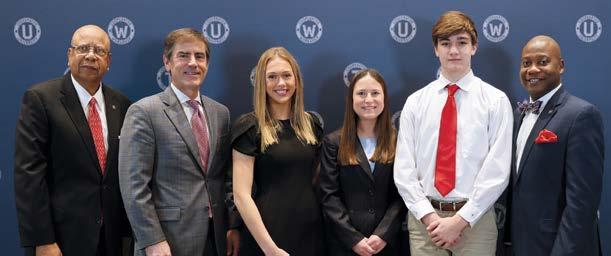



Change is a constant in today’s energy industry. And electric co-ops across the country are leaning into change as we explore new ways to meet tomorrow’s growing energy needs.
Electric co-ops play a crucial role in ensuring the lights come on every time Americans flip the switch. Our primary responsibility is to our members, and we remain committed to providing service that is both reliable and affordable. Energy policy has a profound impact on our ability to accomplish those goals and our national energy policies must embrace this fundamental promise.
The North American Electric Reliability Corporation (NERC), the watchdog for our nation’s grid, has issued several warnings about threats to grid reliability, warning that rolling blackouts could soon be the new norm. Nine states experienced blackouts in 2022 when electricity supply simply could not keep up with demand. And over the next five years, NERC forecasts that all or parts of 19 states from Montana to Louisiana are at high risk of rolling blackouts during normal peak conditions.
These warnings should not be taken lightly, which is why electric co-ops are pressing policymakers to recognize the need for time, technology development and new infrastructure, alongside policies that include a diverse mix of energy sources to maintain reliable power.
The economy of the future will be heavily reliant on electricity. From data centers and manufacturing to electric vehicles and electric heat pumps, the demand for electricity is set to rise dramatically. Co-ops are planning for this surge in demand by investing in infrastructure, technologies, and power supplies that will allow them to meet members’ needs, but additional challenges lie ahead.
Opposite this increasing demand for electricity, many power plants that generate always available electricity are being shut down without adequate replacements, posing a significant threat to reliability. The Environmental Protection Agency (EPA) is pursuing sweeping new regulations that would force the premature closure of always available power plants while also making it harder to permit, site, and build critical new plants. Electric co-ops have urged the EPA to withdraw these proposed regulations that would lead to more blackouts, higher costs, and uncertainty for Americans.
Electric co-ops are at the forefront of innovation and are already adapting to the unique needs of the members we serve. From community solar projects and energy efficiency programs to carbon capture and advanced nuclear generation, co-ops are leading the way.
Advocating for rational policies in Washington, D.C. that preserve reliability and affordability is crucial. This month, electric cooperative leaders will gather in Washington, D.C., for the annual Legislative Conference where they will meet with members of Congress and federal agencies to discuss key issues and concerns surrounding reliability. This allows co-ops to educate policymakers on the issues that matter most to the American families and businesses we serve.
Today’s energy decisions and policies will determine if there are enough resources to meet tomorrow’s energy needs. Electric co-ops will continue advocating for their members to ensure a reliable supply of electricity that powers everyday life.
Louis Finkel is the senior vice president of government relations for the National Rural Electric Cooperative Association.



















You probably don’t think about them until your power goes out, but electric lineworkers protect our homes and communities 24 hours a day. Like other first responders who keep us safe, lineworkers endure all kinds of weather and challenging conditions. In April, we celebrate Lineworker Appreciation Month to honor the men and women who power life. Here are some quick facts about lineworkers and the work they do.
Lineworkers first appeared during the 1840s rush to spread telegraph service across the U.S., stringing wires between trees and other natural objects. It didn’t take long for everyone to realize tall poles were safer and more practical.
Restoring electricity after a power outage is just one of the many duties of lineworkers, who also:
• Install and connect new power lines to homes and businesses
• Maintain and perform upgrades to improve our electric grid
• Diagnose and pinpoint power delivery issues
• Plan and manage large-scale projects
• Ensure safe work practices in often challenging conditions Lineworkers are responsible for maintaining and upgrading the nation’s electric grid that connects more than 7,300 power plants to 145 million consumers through 60,000 miles of high-voltage lines, millions of miles of distribution lines and more than 50 million transformers.
Lineworkers climb with up to 40 pounds of safety gear and tools. That’s like carrying a 5-gallon water jug! Here’s what they typically wear to stay safe while working:
• Hard hats
• Safety glasses
• Flame-resistant clothing
• Arc flash protective clothes
• Rubber gloves & sleeves
• Climbing belts
• Fall-protection harnesses
One essential tool for lineworkers is the hot stick, an insulated fiberglass pole used to safely move energized wires and other equipment. Hot sticks vary in size depending on the job.

Squirrels and snakes are a major cause of power outages, and lineworkers encounter plenty of both while working. They’ve also been known to rescue kittens that climbed too high in a tree and curious bears on top of utility poles. When your o ce is the great outdoors, these encounters are part of the job.
Described by the Energy Department as one of the nation’s highestpaid professions that doesn’t demand postsecondary education, becoming a journeyman lineworker typically requires a high school diploma or equivalent, training and a paid apprenticeship, which typically spans four years. Apprentice lineworkers receive hands-on training and experience in the field before advancing to “journeyman” status. Lineworker salaries range from $40,000 to $144,000, depending on location, skillset and experience.
Roughly 60,000 lineworkers hit the road annually to respond to devastating storms and the damage they leave behind. In addition to extreme weather exposure, lineworkers face a variety of dangers, including electric shock, falls from elevated work locations and roadside tra c accidents. High injury rates among early lineworkers led to the creation of apprenticeship programs and organized labor throughout the industry.
Safety is always the number one priority, which is why lineworkers continuously receive training to stay mindful of safety requirements and up to date on the latest equipment and procedures.
Lineworkers power our lives. The next time you see one, remember to thank them for the essential work they do.







A group of 85 high school juniors from all over the state gathered in Jackson from Feb. 21 to Feb. 23 for the 37th Electric Cooperatives of Mississippi Cooperative Leaders Workshop.
The program instills leadership skills, inspires creative thinking, encourages community service, and introduces students to legislative elected o cials from their communities.
The conference was held at The Westin in downtown Jackson.
The students earned the trip to the workshop following a competitive selection process sponsored by their local electric cooperative. They will travel to Washington, D.C. in June for a seven-day youth leadership tour.





Yazoo Valley Electric students Adalai Boggan, Avery Alexander, and Hannah Parker spent the three days in Jackson with other students from around the state. They met with their state lawmakers, toured the state capitol, participated in problem solving activities, and attended speeches by motivational speakers — including one by political cartoonist Marshall Ramsey — who urged them to serve their communities.
Lt. Gov. Delbert Hosemann and Secretary of State Michael Watson spoke to the students during the workshop.








Change is a constant in today’s energy industry. And electric co-ops across the country are leaning into change as we explore new ways to meet tomorrow’s growing energy needs.
Electric co-ops play a crucial role in ensuring the lights come on every time Americans flip the switch. Our primary responsibility is to our members, and we remain committed to providing service that is both reliable and affordable. Energy policy has a profound impact on our ability to accomplish those goals and our national energy policies must embrace this fundamental promise.
The North American Electric Reliability Corporation (NERC), the watchdog for our nation’s grid, has issued several warnings about threats to grid reliability, warning that rolling blackouts could soon be the new norm. Nine states experienced blackouts in 2022 when electricity supply simply could not keep up with demand. And over the next five years, NERC forecasts that all or parts of 19 states from Montana to Louisiana are at high risk of rolling blackouts during normal peak conditions.
These warnings should not be taken lightly, which is why electric co-ops are pressing policymakers to recognize the need for time, technology development and new infrastructure, alongside policies that include a diverse mix of energy sources to maintain reliable power.
The economy of the future will be heavily reliant on electricity. From data centers and manufacturing to electric vehicles and electric heat pumps, the demand for electricity is set to rise dramatically. Co-ops are planning for this surge in demand by investing in infrastructure, technologies, and power supplies that will allow them to meet members’ needs, but additional challenges lie ahead.
Opposite this increasing demand for electricity, many power plants that generate always available electricity are being shut down without adequate replacements, posing a significant threat to reliability. The Environmental Protection Agency (EPA) is pursuing sweeping new regulations that would force the premature closure of always available power plants while also making it harder to permit, site, and build critical new plants. Electric co-ops have urged the EPA to withdraw these proposed regulations that would lead to more blackouts, higher costs, and uncertainty for Americans.
Electric co-ops are at the forefront of innovation and are already adapting to the unique needs of the members we serve. From community solar projects and energy efficiency programs to carbon capture and advanced nuclear generation, co-ops are leading the way.
Advocating for rational policies in Washington, D.C. that preserve reliability and affordability is crucial. This month, electric cooperative leaders will gather in Washington, D.C., for the annual Legislative Conference where they will meet with members of Congress and federal agencies to discuss key issues and concerns surrounding reliability. This allows co-ops to educate policymakers on the issues that matter most to the American families and businesses we serve.
Today’s energy decisions and policies will determine if there are enough resources to meet tomorrow’s energy needs. Electric co-ops will continue advocating for their members to ensure a reliable supply of electricity that powers everyday life.
Louis Finkel is the senior vice president of government relations for the National Rural Electric Cooperative Association.

Part of our mission at Today in Mississippi is educating our members about the cooperative industry and how decisions made in Washington, D.C. a ect all of us back home.
We take our job of providing safe, a ordable, and reliable power very seriously.
Being reliable is near and dear to our reputation.
Reliability is the centerpiece of our argument for an electric grid our members can depend on to deliver power you can a ord.
We know members have concerns that the lights won’t stay on when our system is stressed.
When we look at how Washington is handling these situations, we don’t see a pretty picture. Regulations with arbitrary timelines. Technology mandates. A system increasingly out of balance: we have record electric peaks and growing electric demand, but we’re prematurely shutting down power plants. We can’t get permits to build new transmission. Bureaucrats want to breach dams and tear out baseload hydropower. And gas plants designed for peak demand are now running more and more hours every year.
We know that means higher energy costs for everyone and less firm supply, and less certainty we can get electricity when members need it.
Last fall, the people responsible for advising the U.S. government on electric reliability told us, for the first time ever, one of the biggest threats to a reliable electric grid, is bad public policy.
Bad legislation, poorly-thought-out regulation, faulty assumptions, and mandates put reliability at risk.
A great example of this flawed thinking is the power plant regulation proposed by the Environmental Protection Agency last year. I guarantee you they never thought about reliability. The EPA wants to shut down existing generation and mandate new technologies that aren’t ready for prime time.
What the EPA is asking us to do is to take a big step forward, but to do it in the dark. And this is not a time or a topic to rush. When we make these kinds of decisions, we need to know we’re on solid ground.
Things have gotten this way because the conversation about energy policy – the positions people are taking, and the decisions people are making – are disconnected from the consequences they can cause.
And we have to re-connect them.
Co-ops keep the lights on. Reliability is the most important thing to us. If legislators and regulators understand nothing more than that, then they will listen to us now, when it matters.
What’s happening in Washington a ects all of us. It a ects our businesses, and our communities.
Carbon capture and hydrogen fuel technologies aren’t ready enough or cheap enough to be commercial-scale environmental solutions. We’ve told the EPA not to mandate them in new rules on our industry.
But we also support that argument with real-world experience. Co-ops are global industry leaders in testing and demonstrating those very technologies. It’s not theoretical to us. We know what we’re talking about.
Leaders are listening to us.
We’re investing in innovation. When we get opportunities to move the ball – on broadband, on new technology, on storage, on demand response, and energy e ciency – electric cooperatives step up and deliver.
Our message to D.C.: if you let us do our job, we will. Don’t paint us, or regulate us, with one broad brush. Flexibility and local control are key to our success.
We’re the only ones with the political courage to ask this one tough question and answer it honestly. We’re the only ones sticking up for the people who pay the bills – you, our members. You expect us to perform this simple, but incredibly important job.
We’re the leading voice on electric reliability because cooperatives are reliable. We are trustworthy and dependable.
We serve our communities by listening to members and finding the best solutions –solutions that work – cooperatively.
It’s the best thing about who we are, what we do, and who we work for.
 by Michael Callahan
Executive Vice President/CEO Electric Cooperatives of Mississippi
by Michael Callahan
Executive Vice President/CEO Electric Cooperatives of Mississippi


I’ll stay here in good ole south Mississippi, where I can speak Southern English with a drawl. And my speed of life is reduced to a crawl.
Peas and cornbread, smoked hocks, and collard greens are all 5-star dining to me! I eat dinner in the middle of the day and supper about 6 at night — Southern style.
I’ve been and seen plenty of the “othern,” so I’ll keep on being very southern in Mississippi.
Pass the peas and cornbread, fried chicken, and okra please! by Gene Laythe, a resident of Richton, and a member of Pearl River Valley Electric
What’s Mississippi to you?
What do you treasure most about life in our state? Send your brief thoughts to Today in Mississippi, news@ecm.coop or mail to P.O. Box 3300, Ridgeland, MS 39158
Submit your beautiful digital photo of life in Mississippi to Today in Mississippi, news@ecm.coop
















